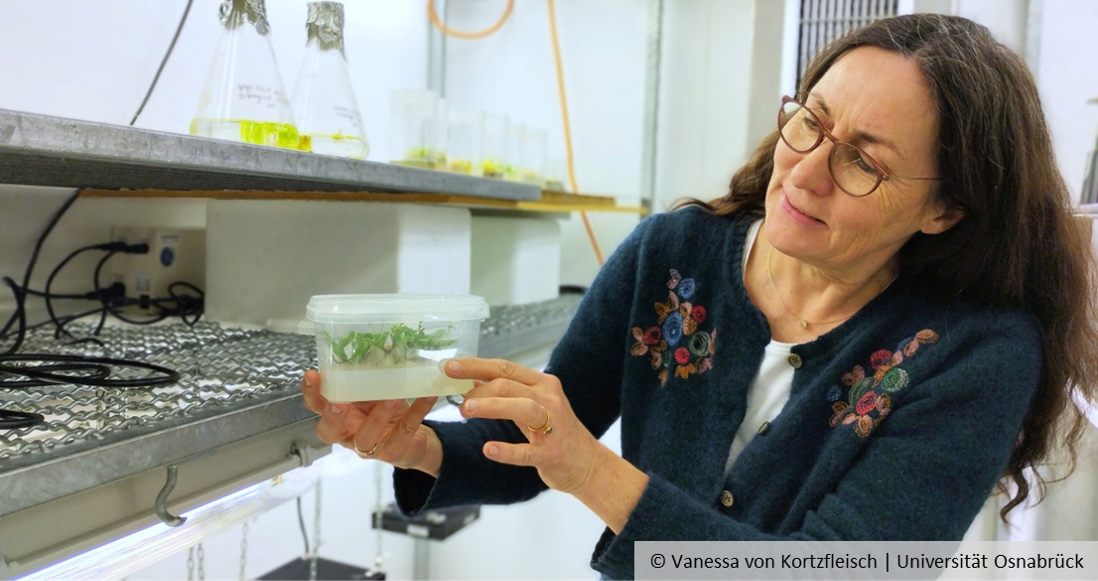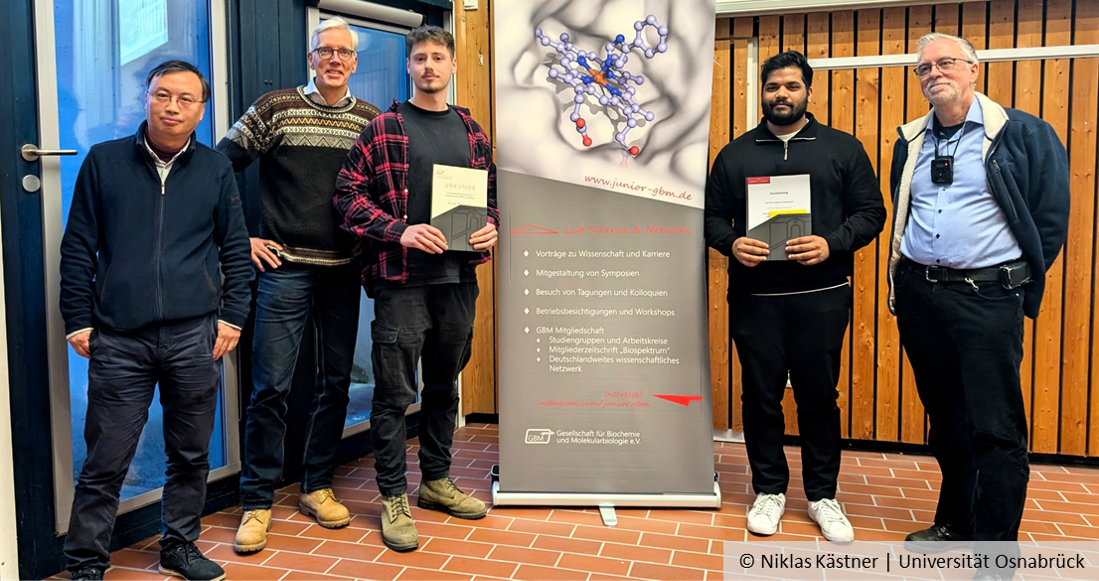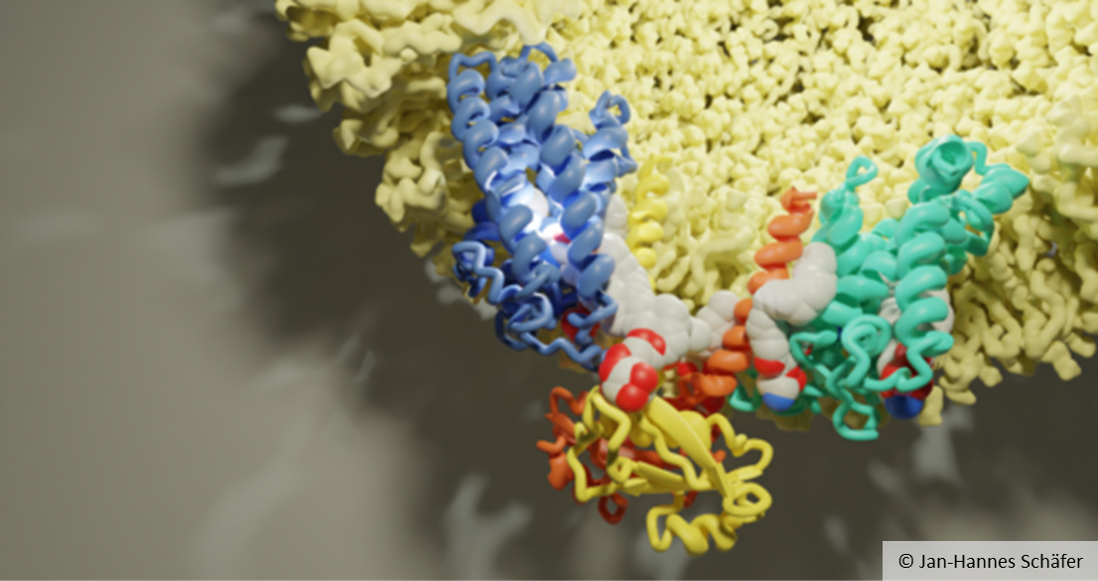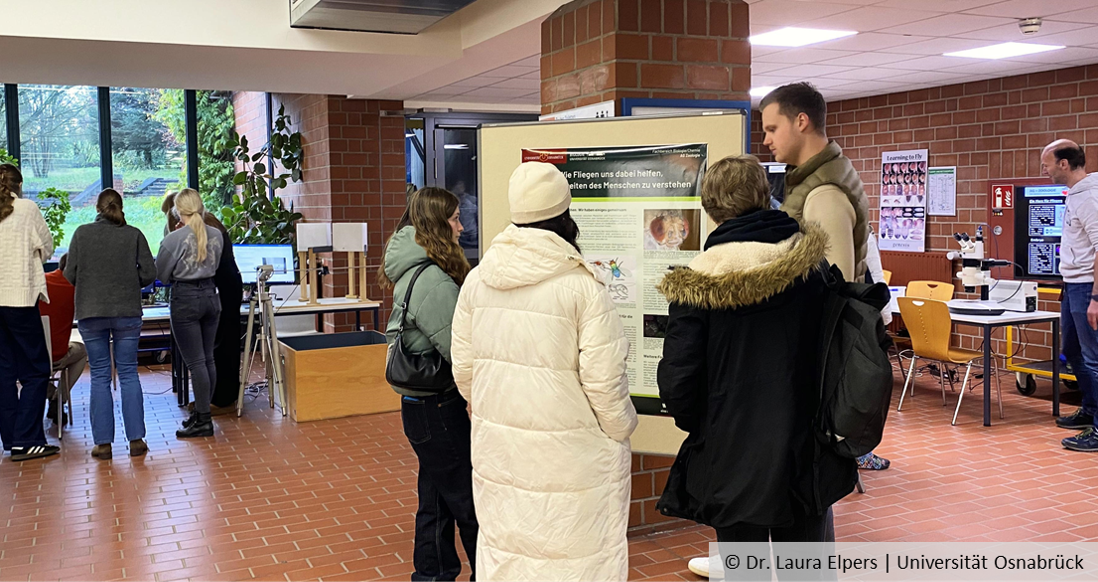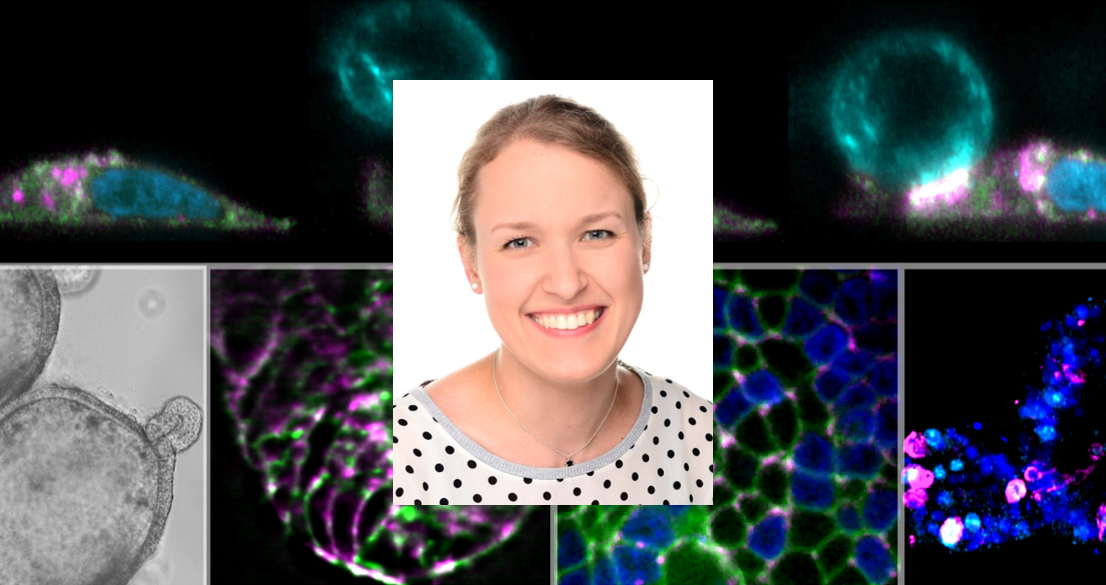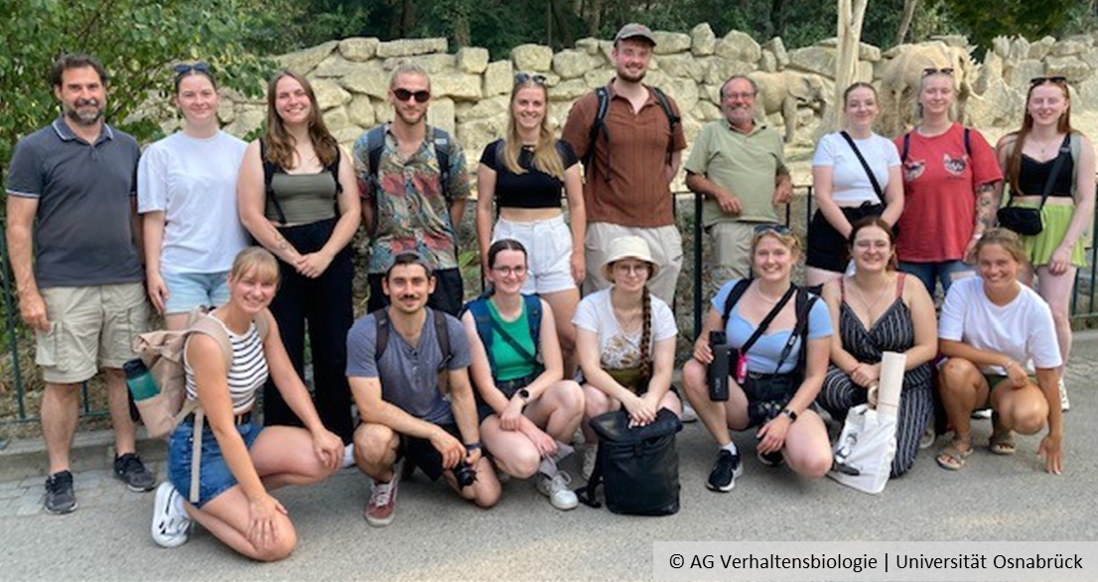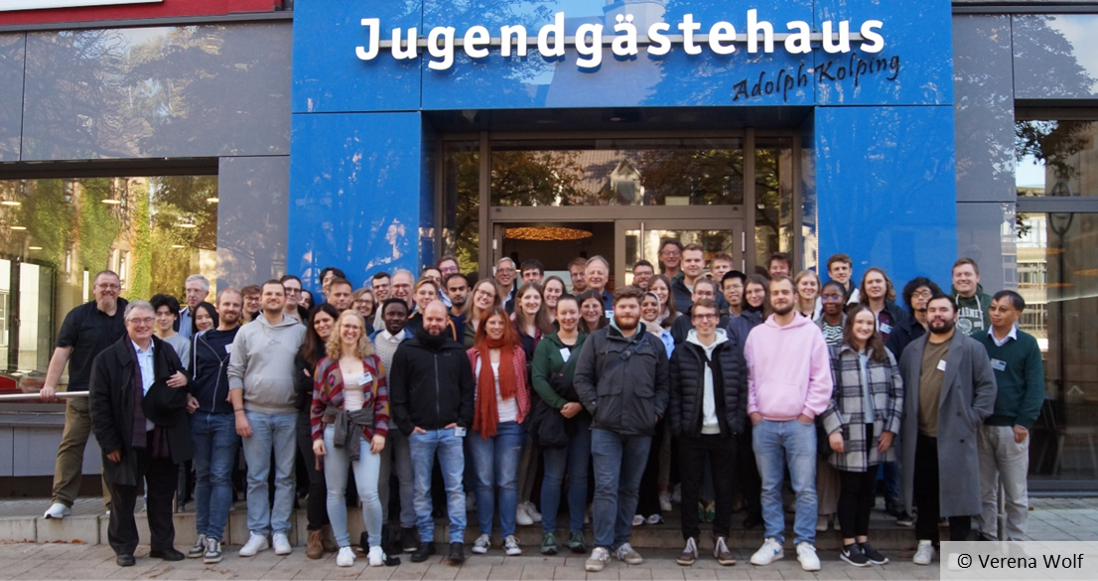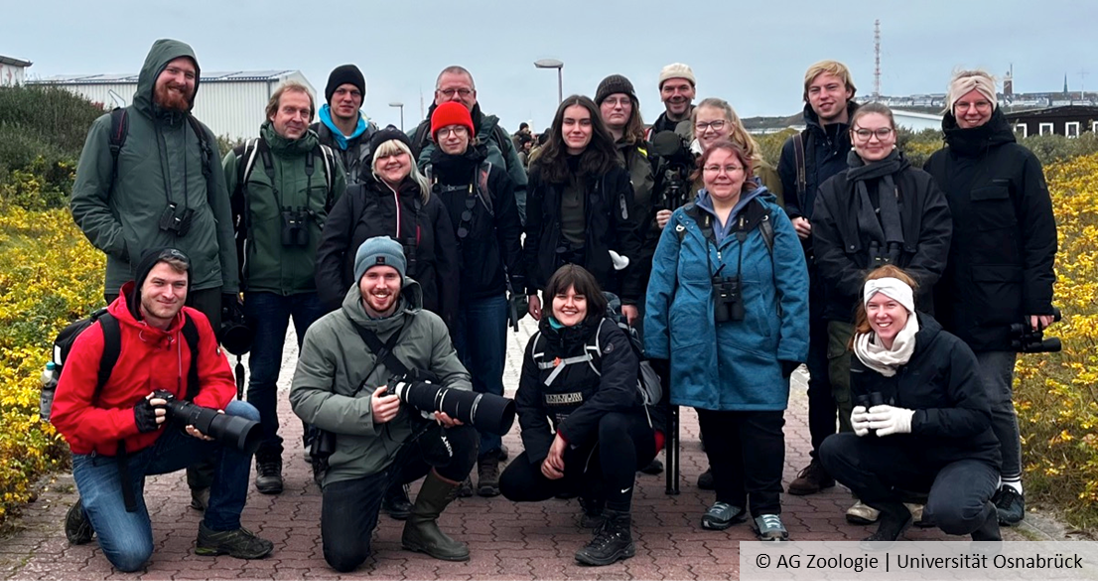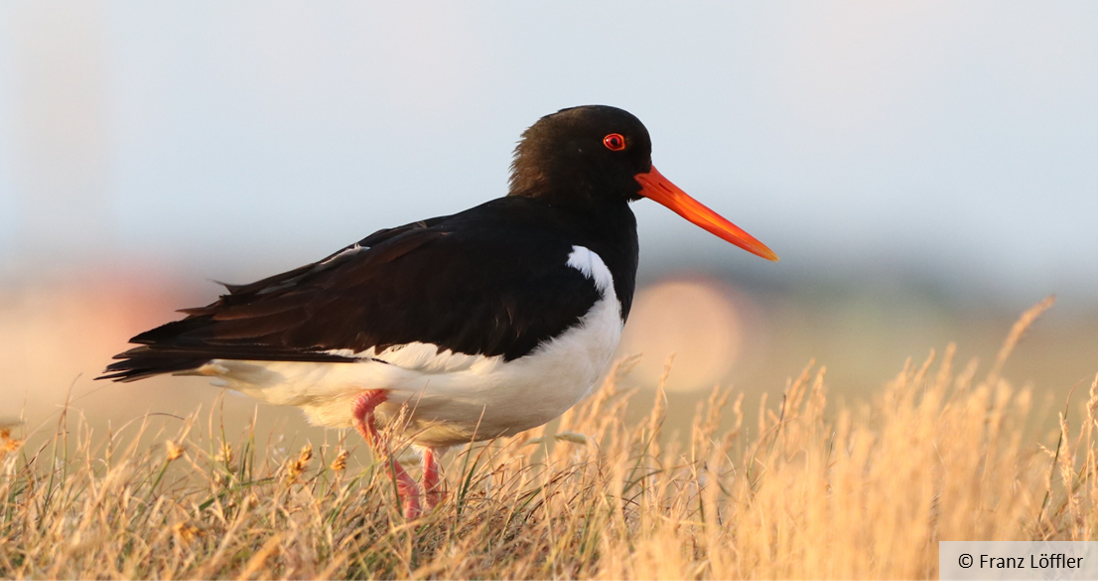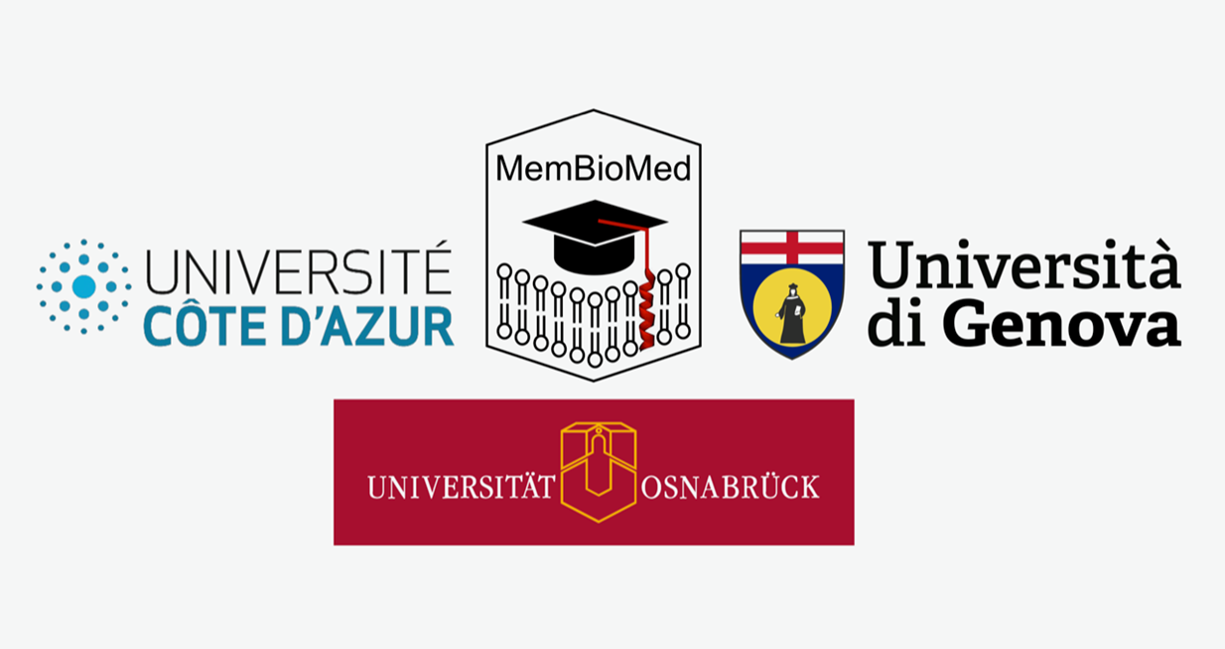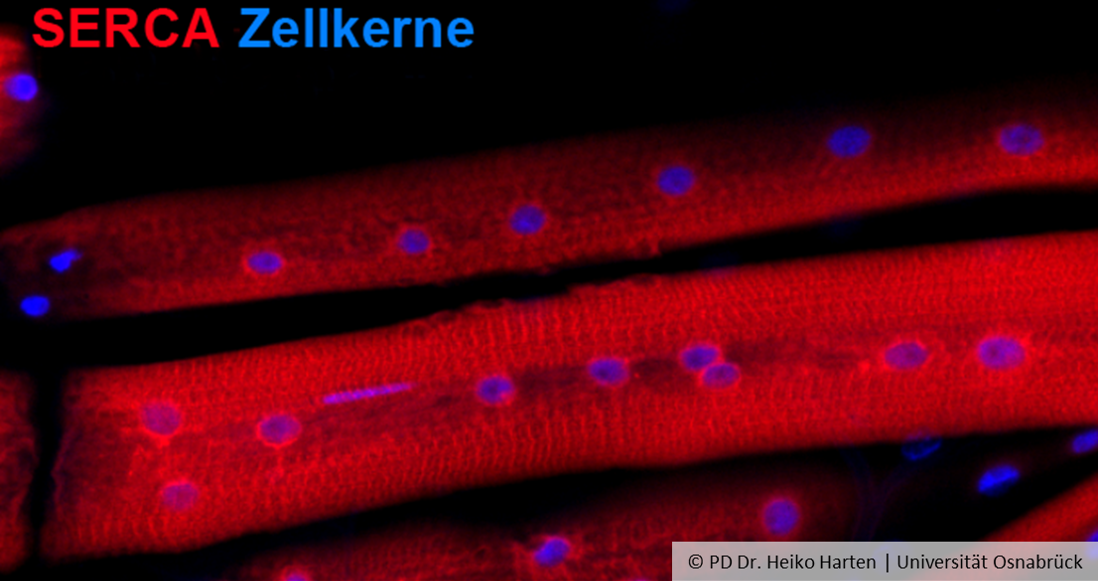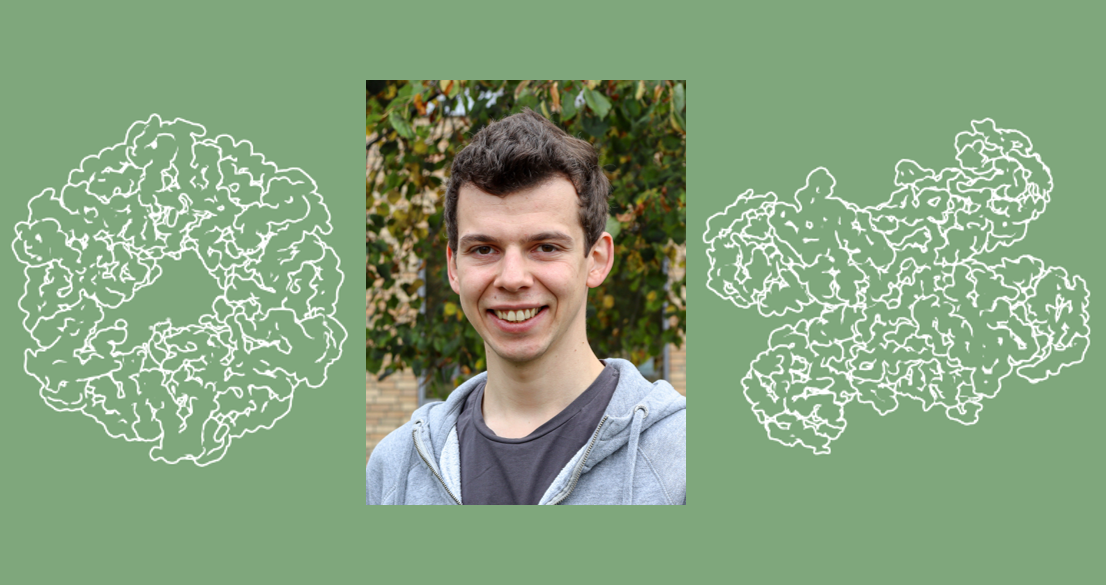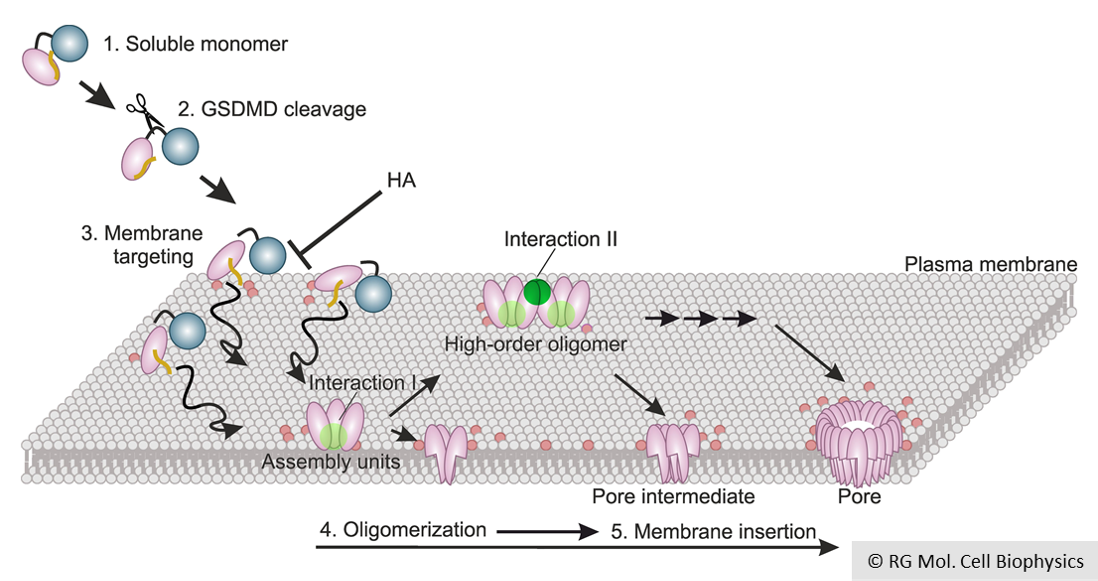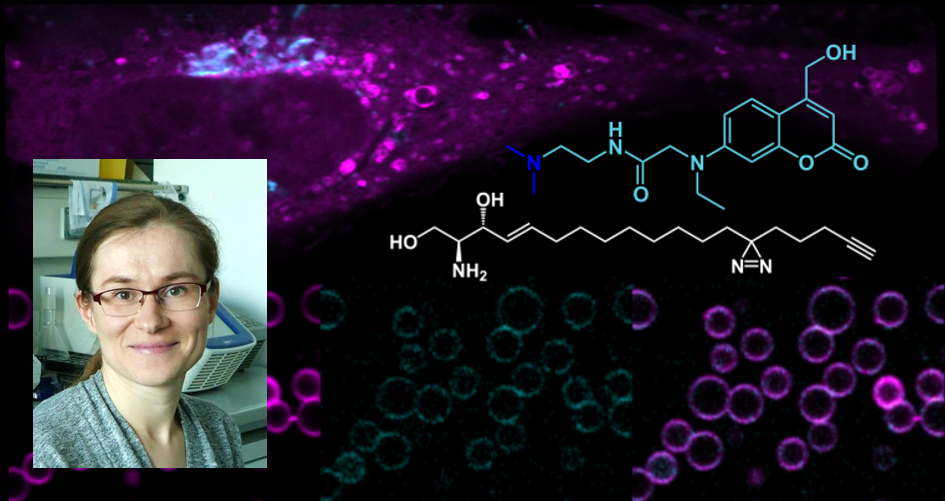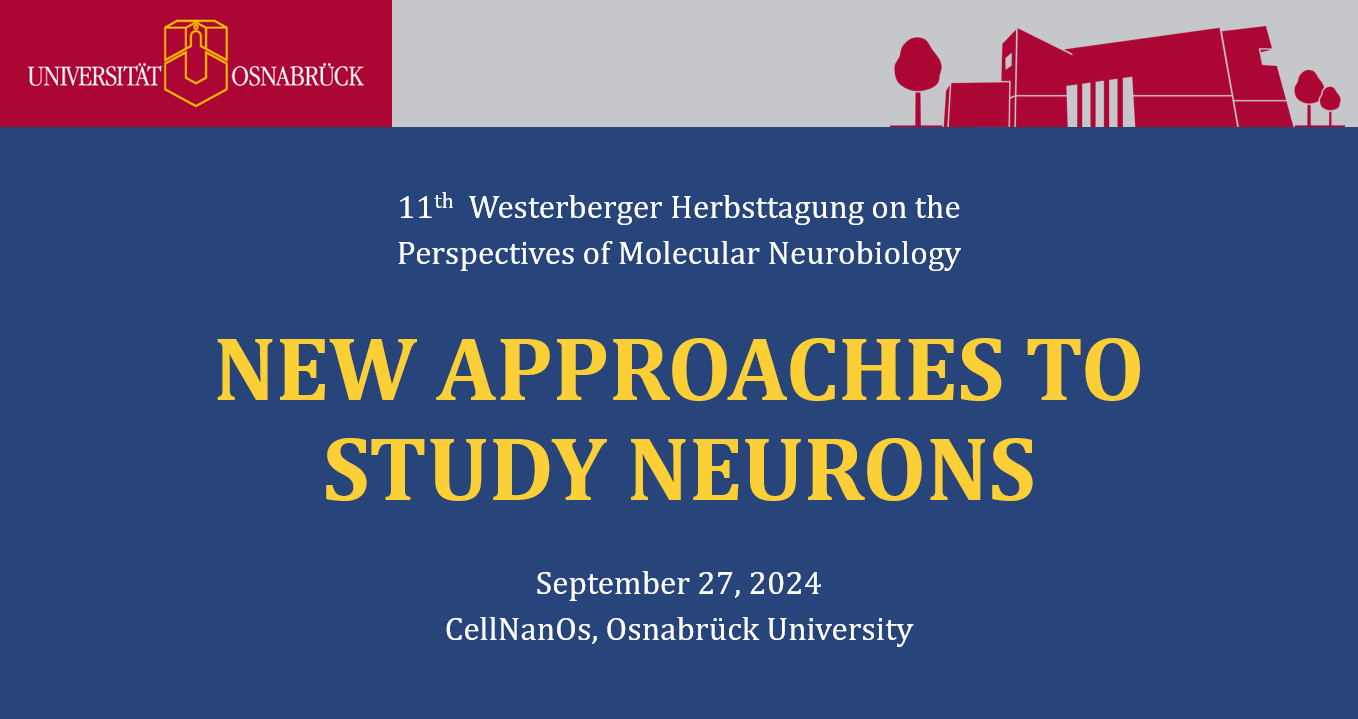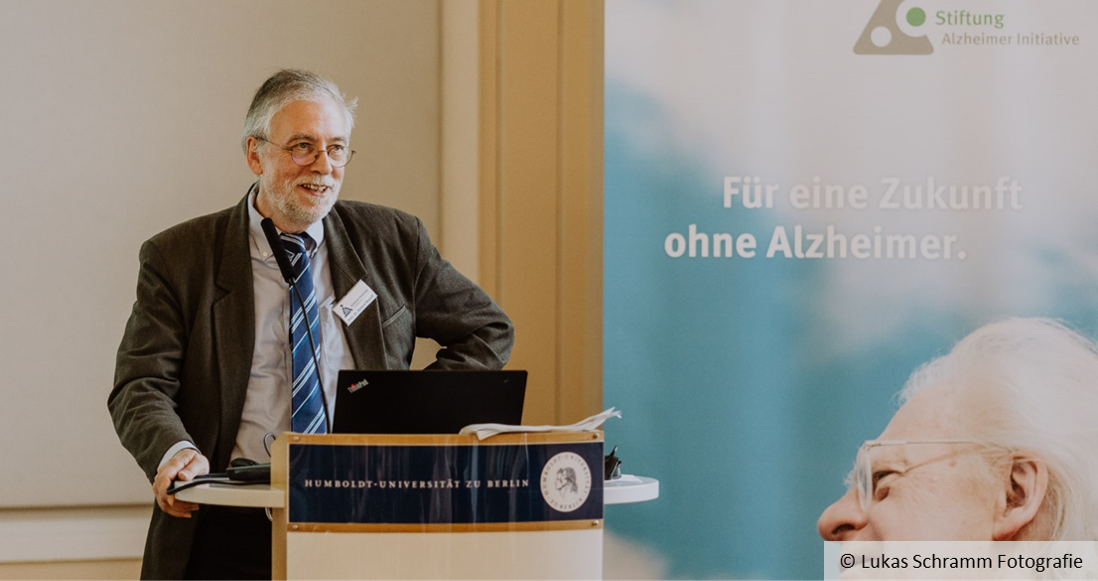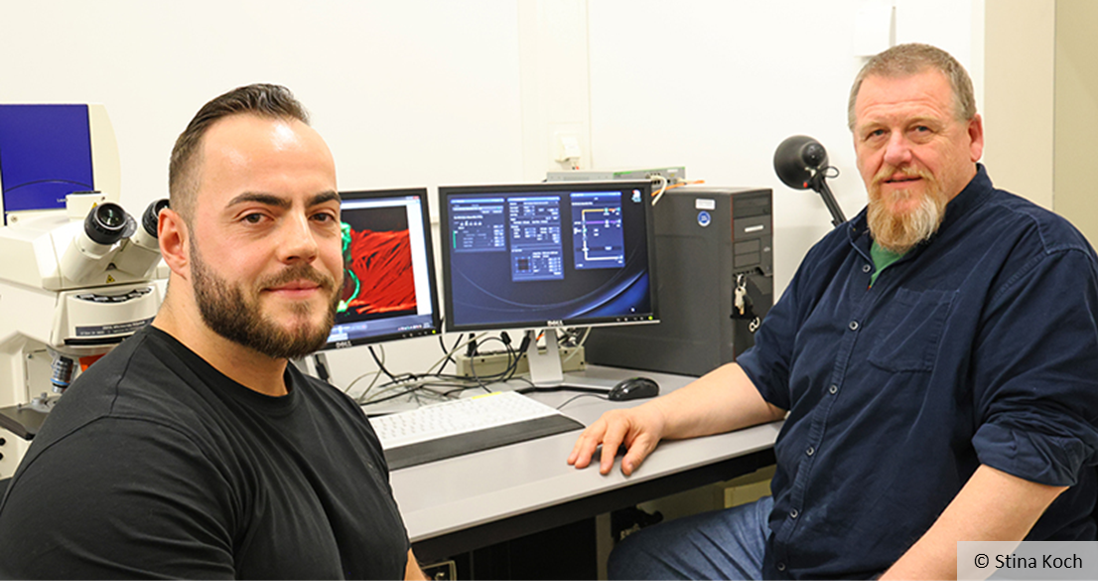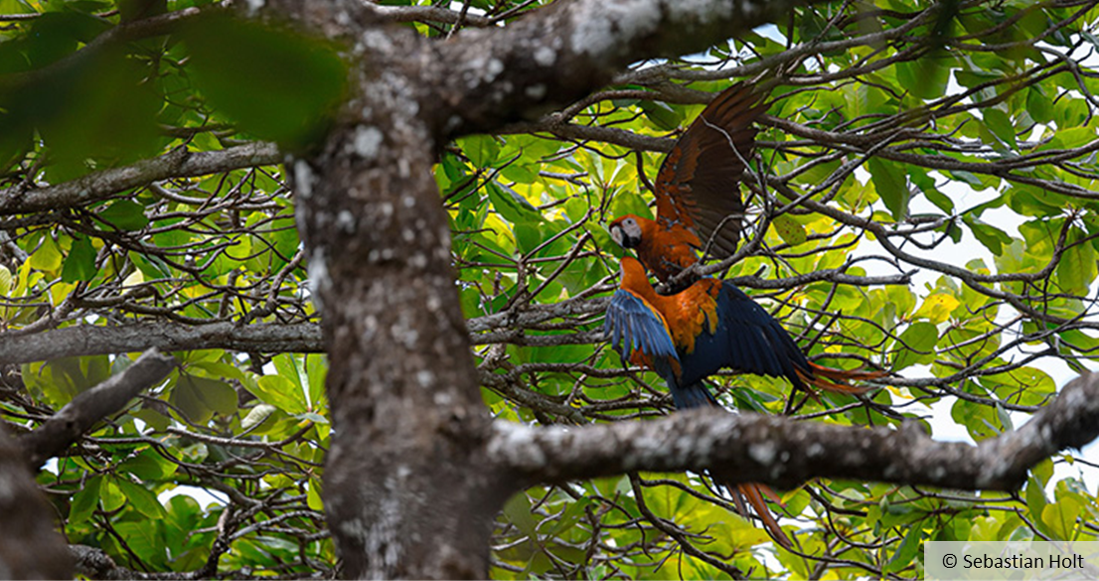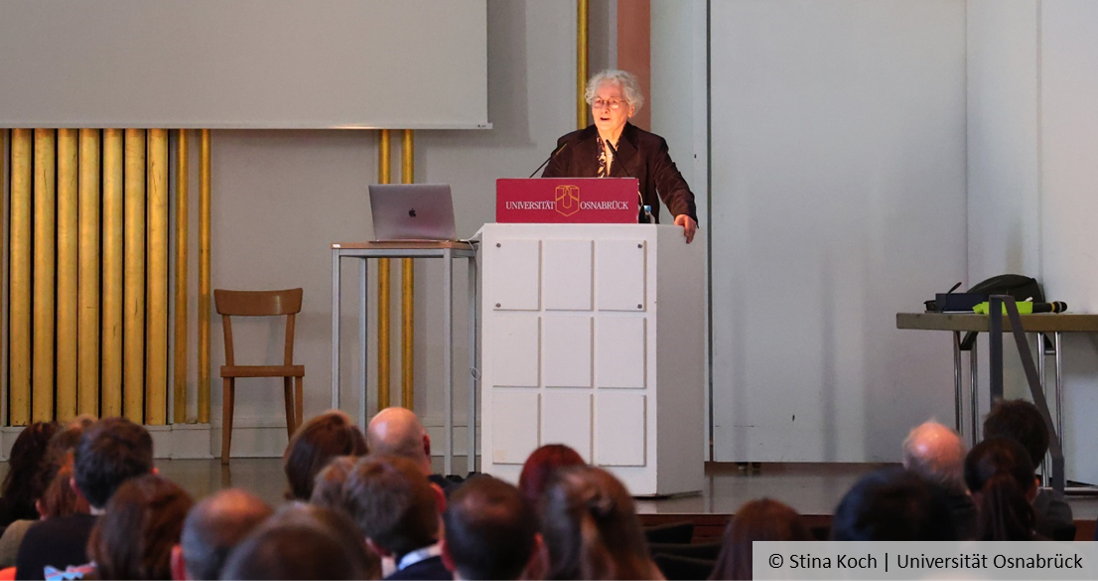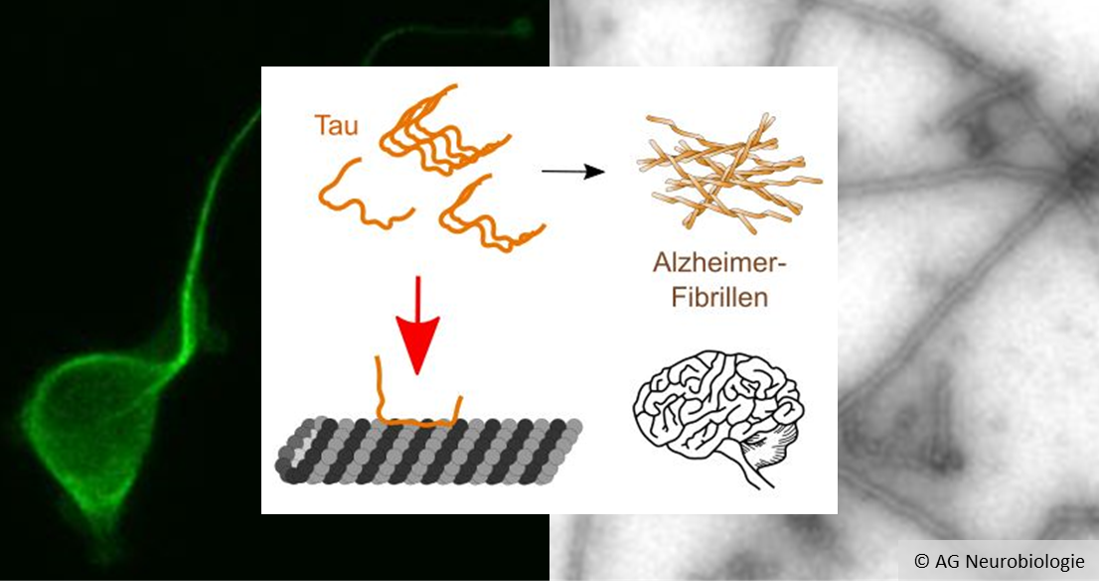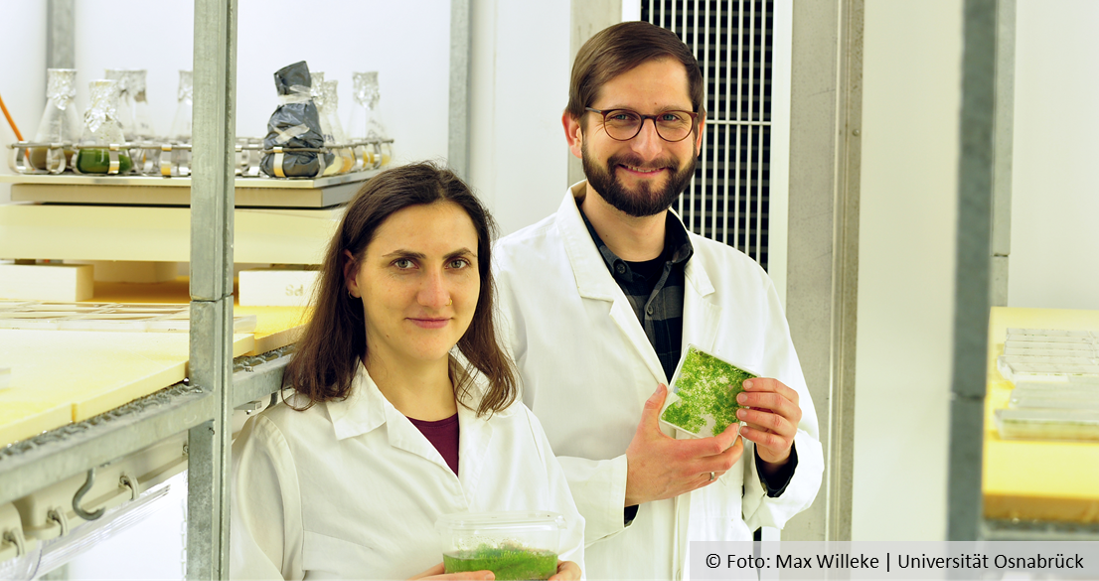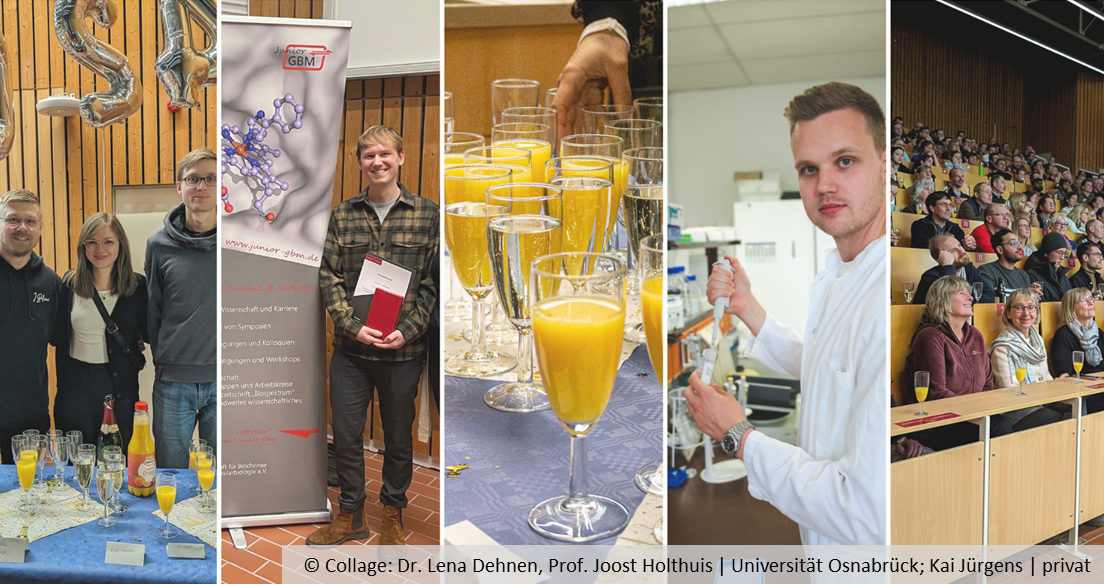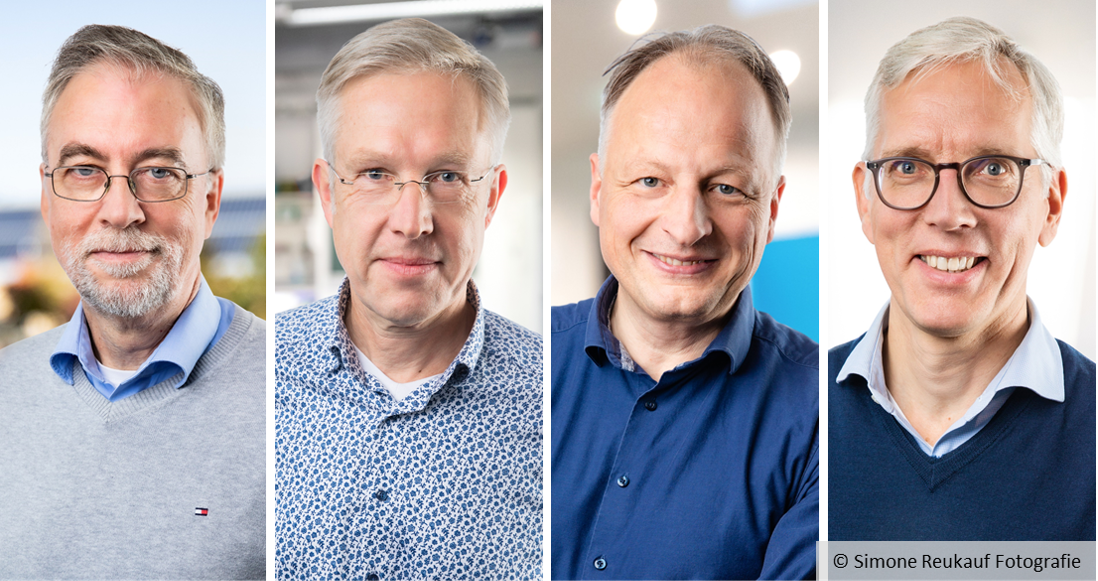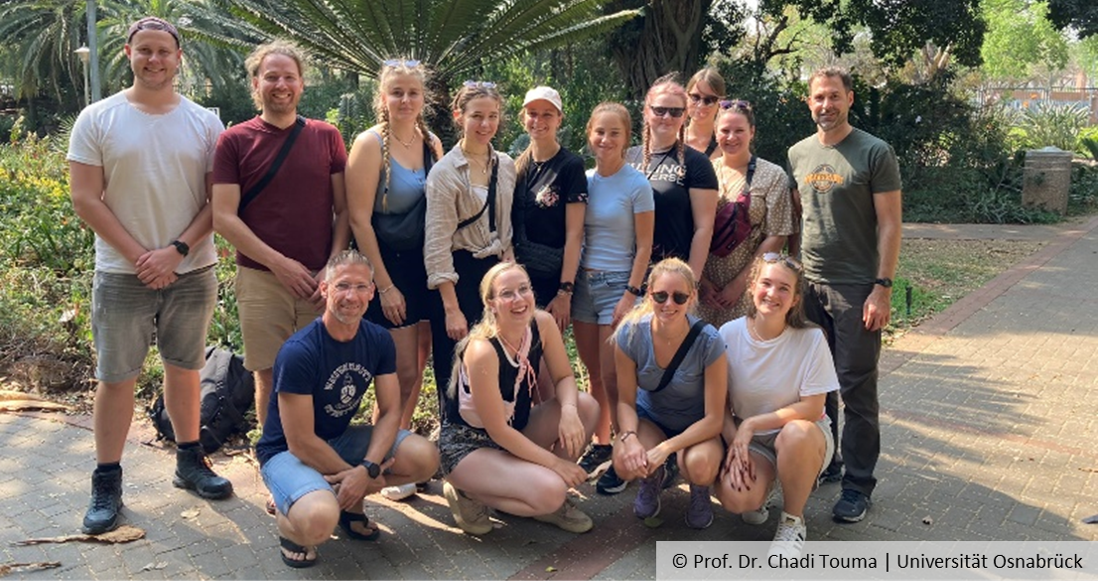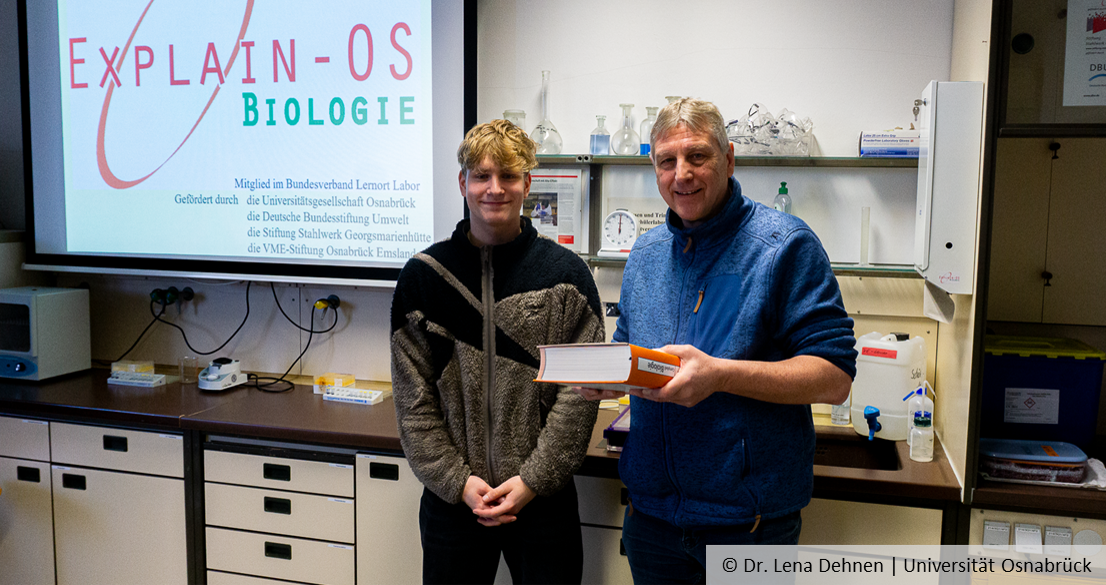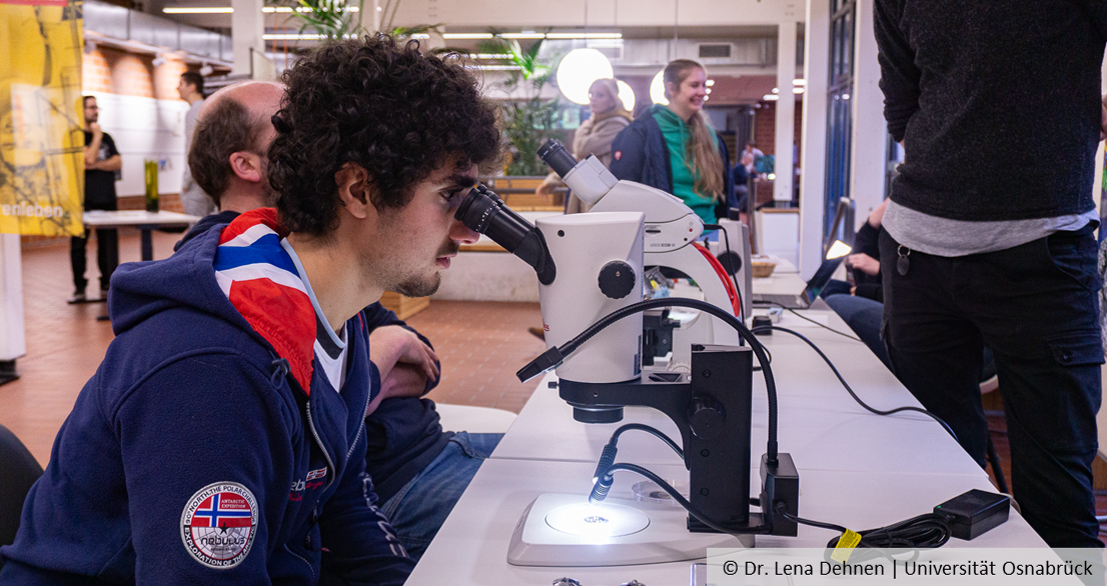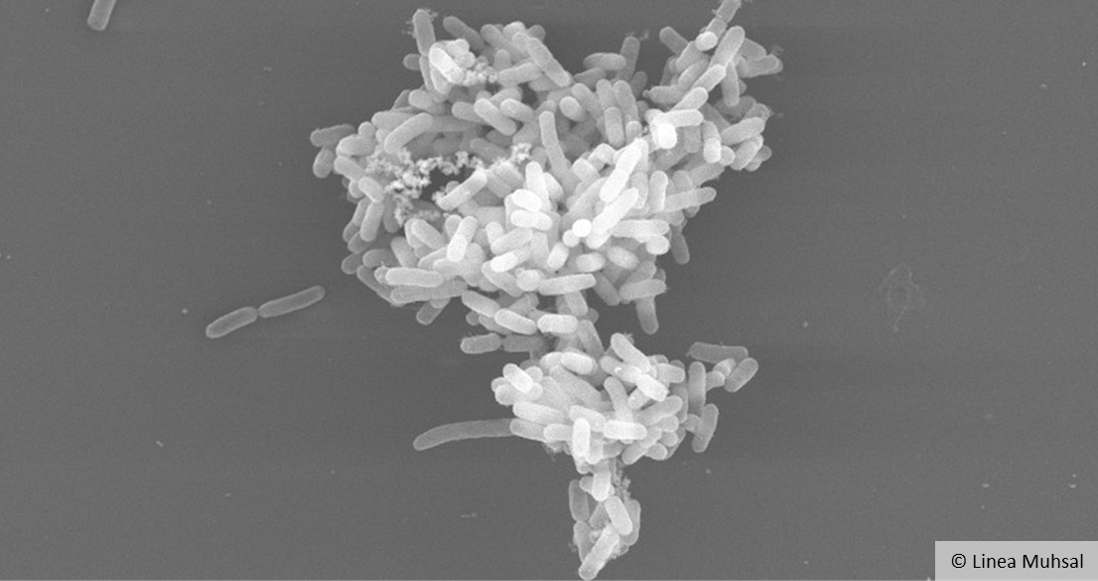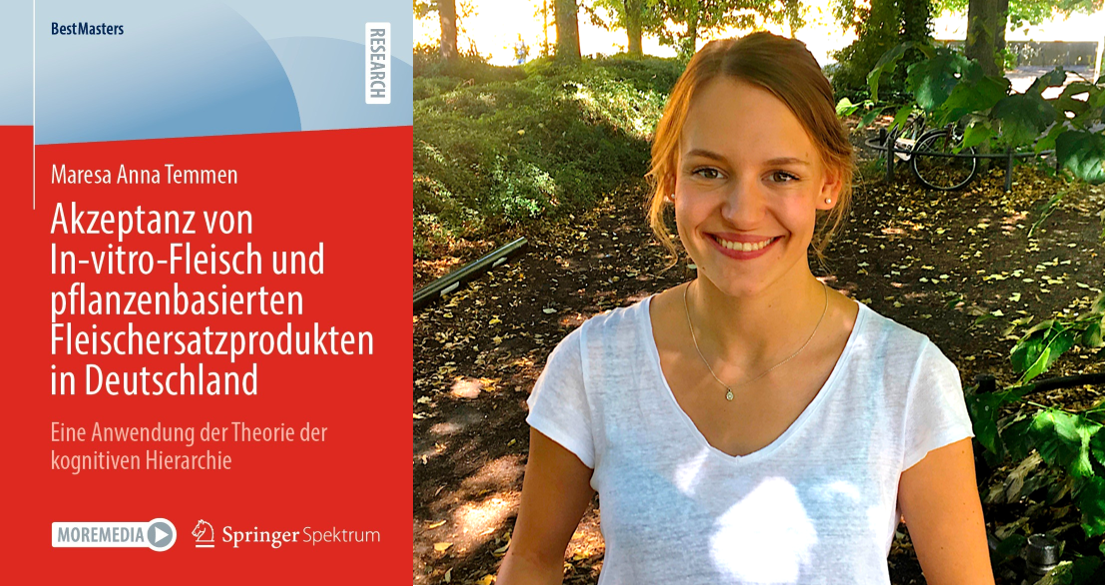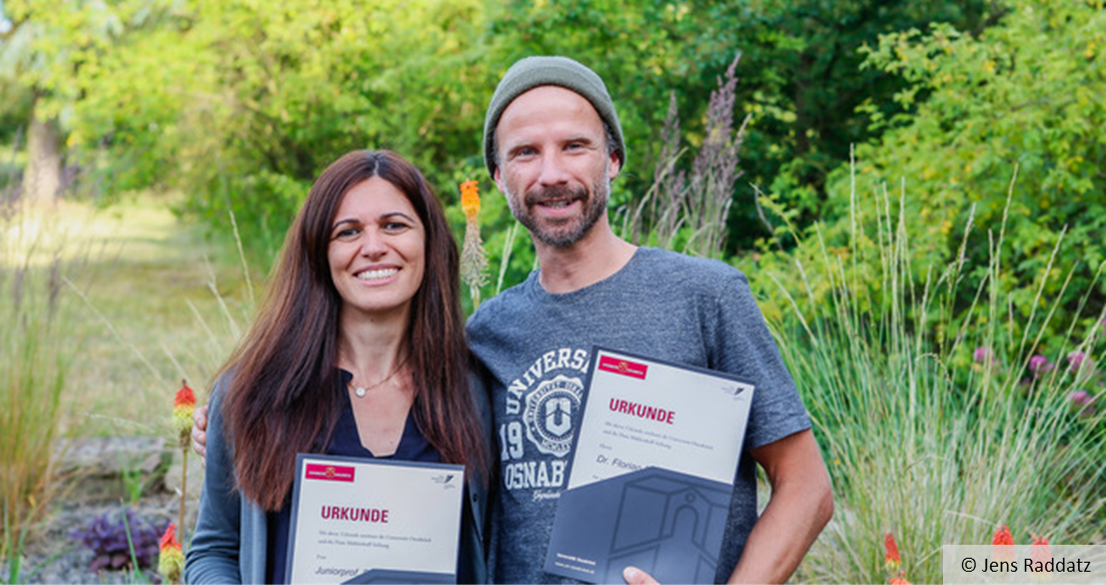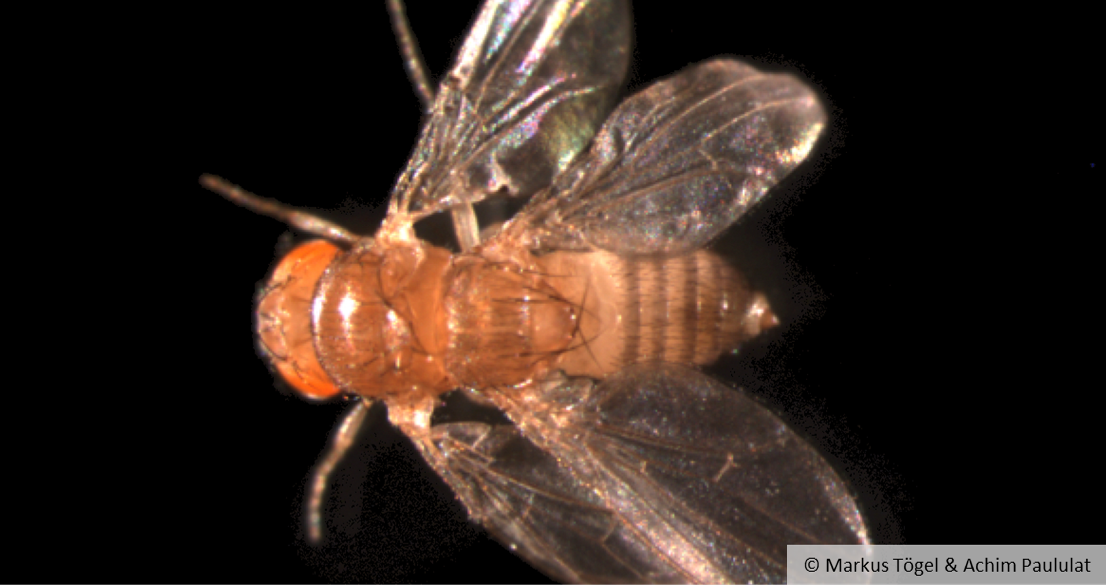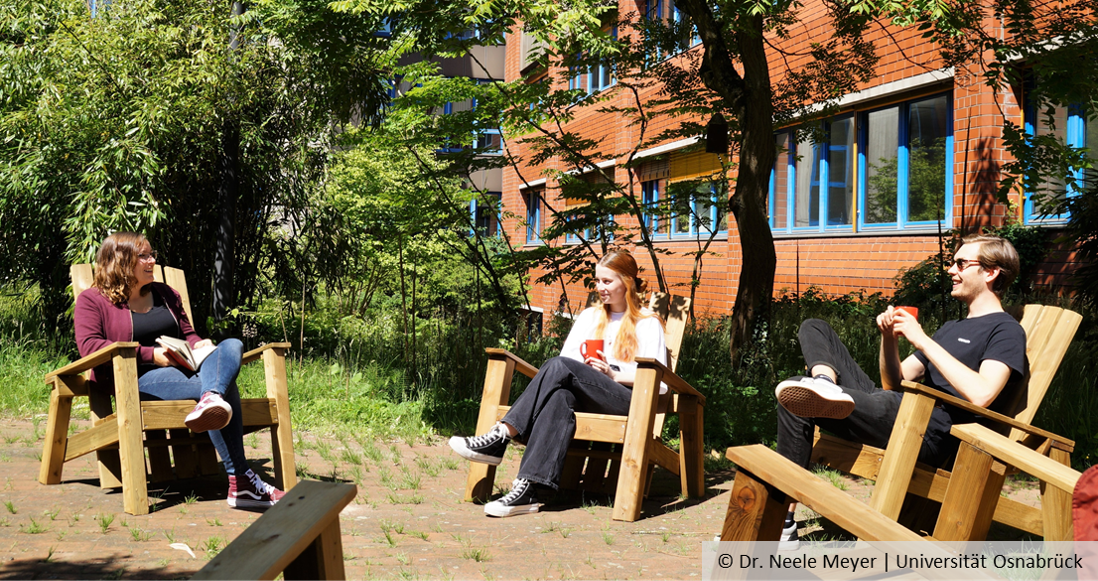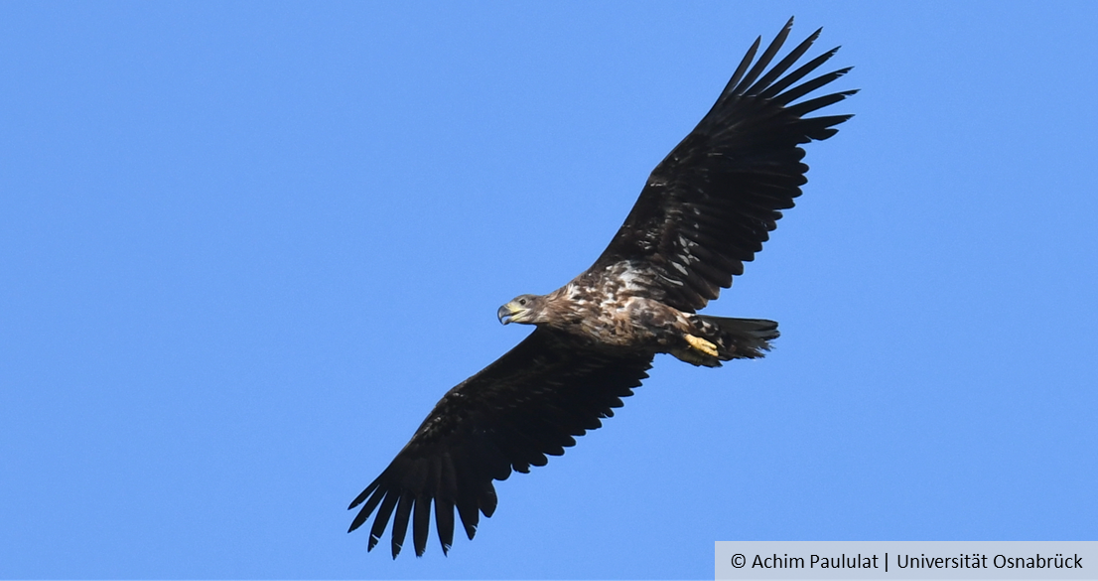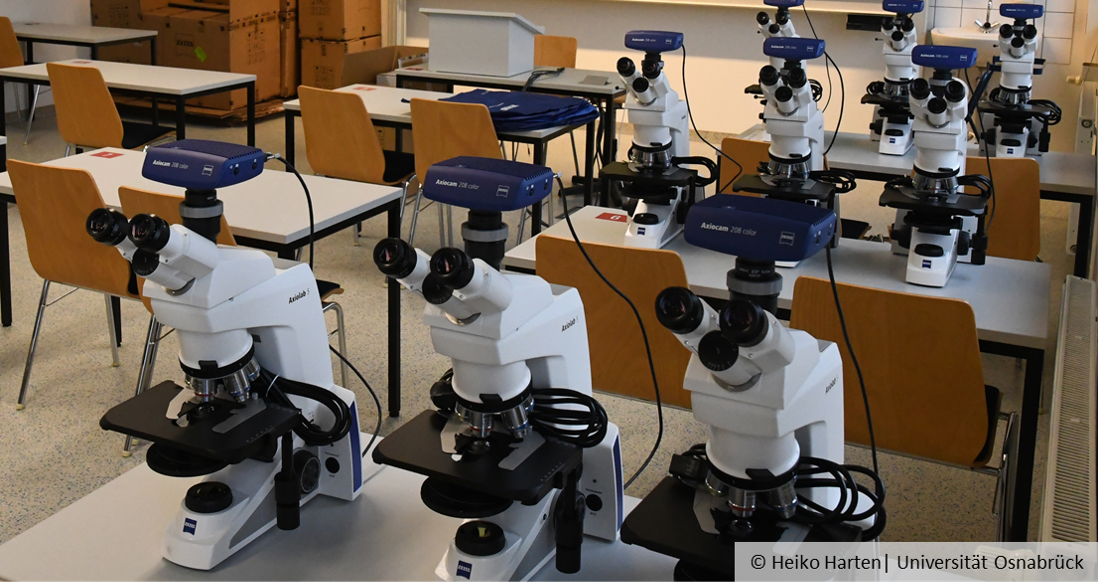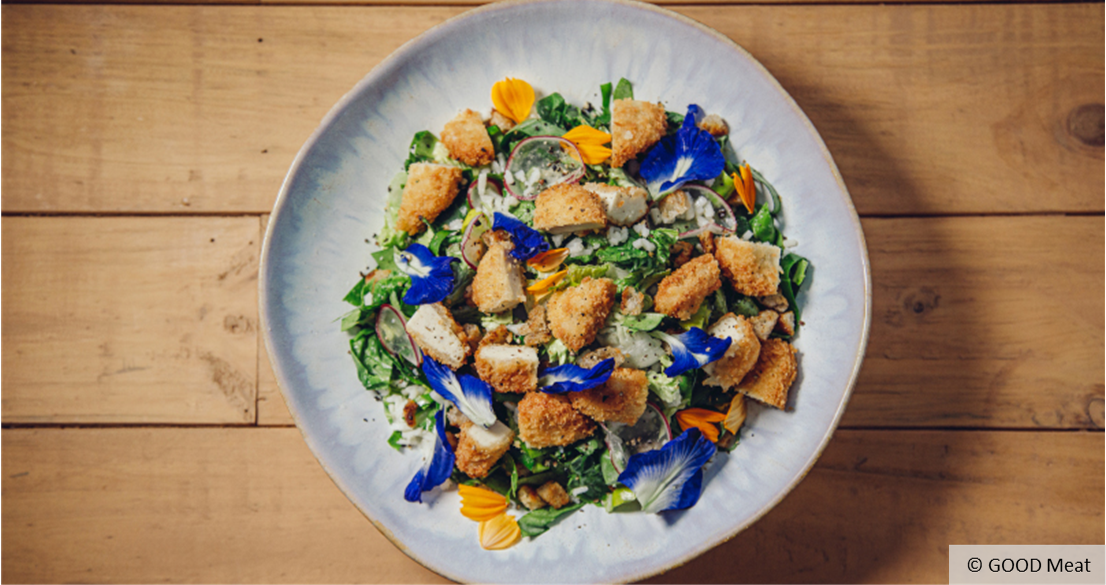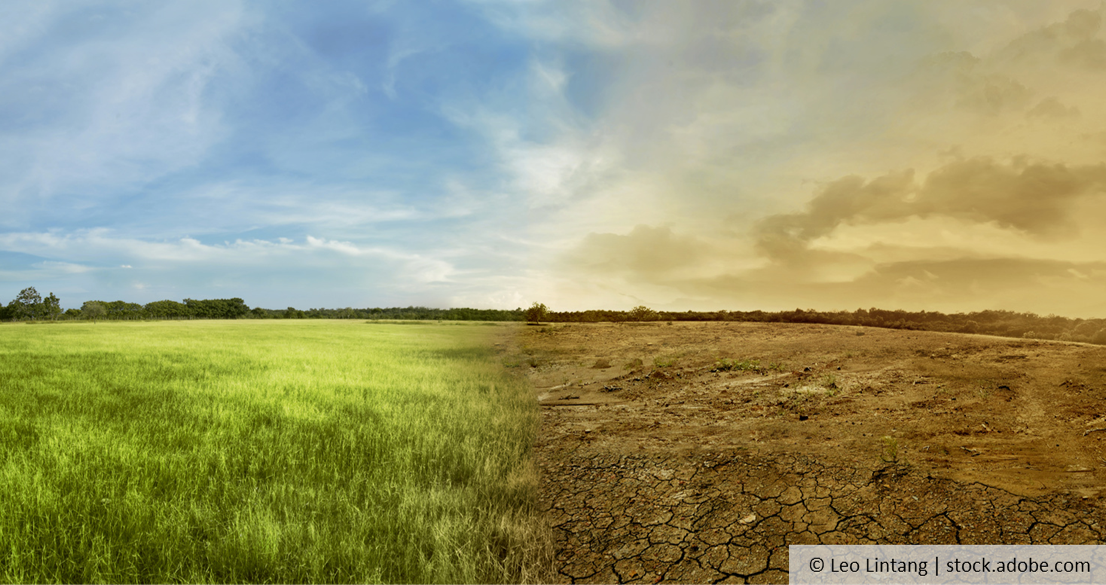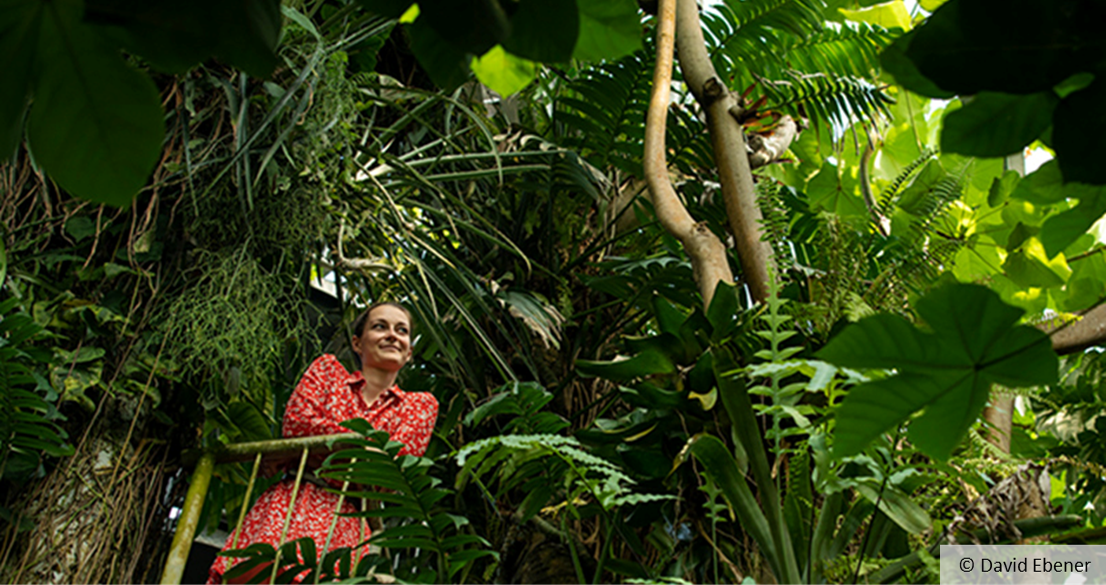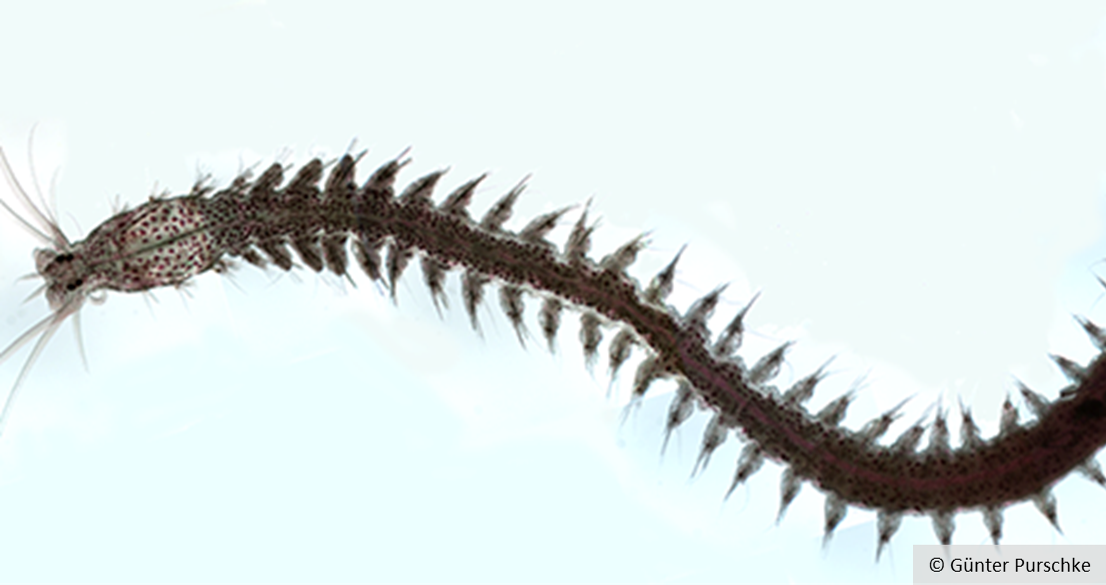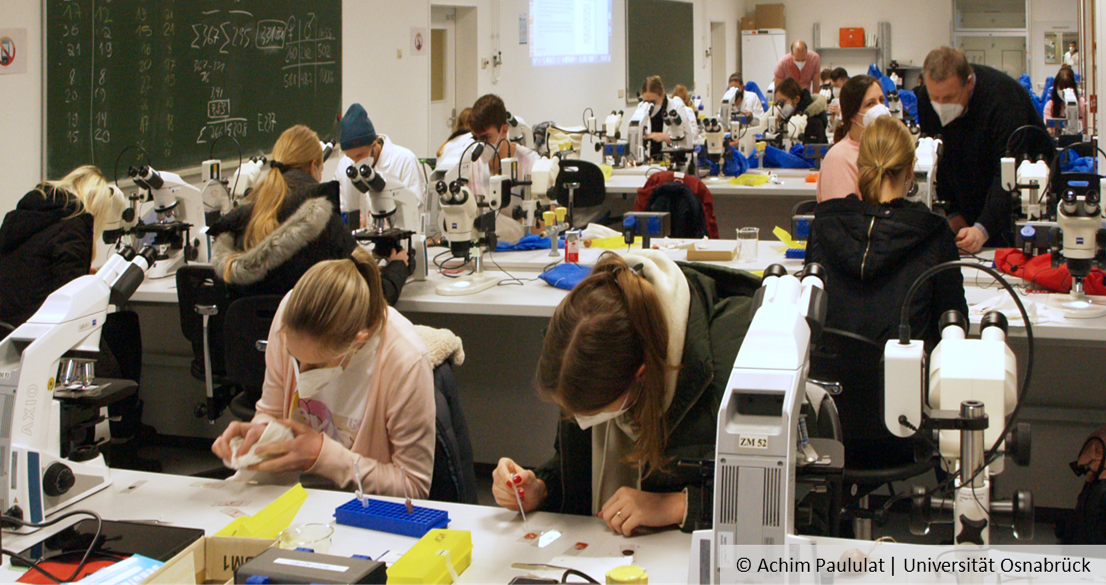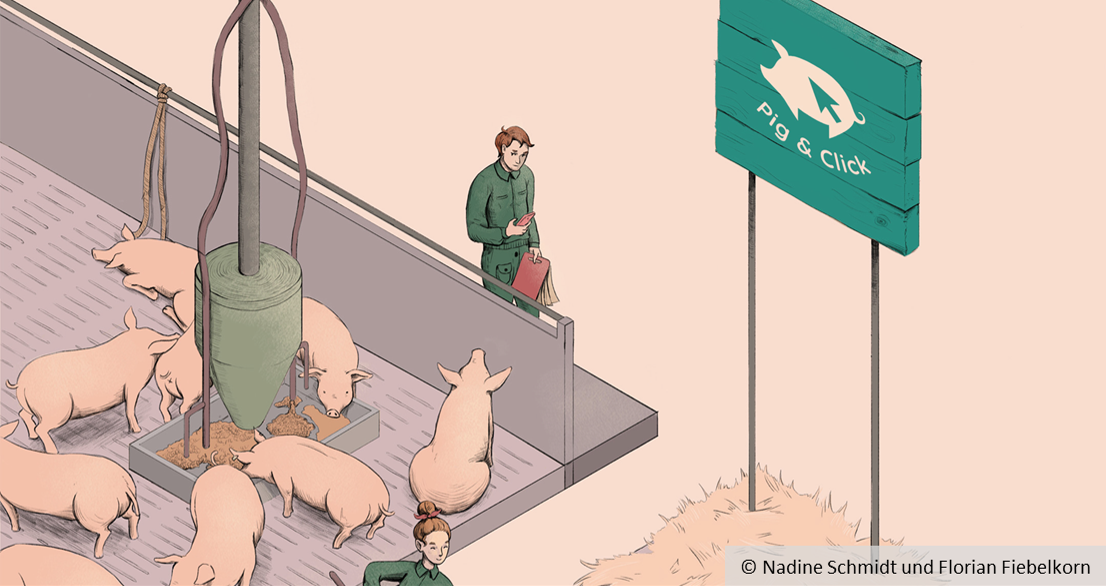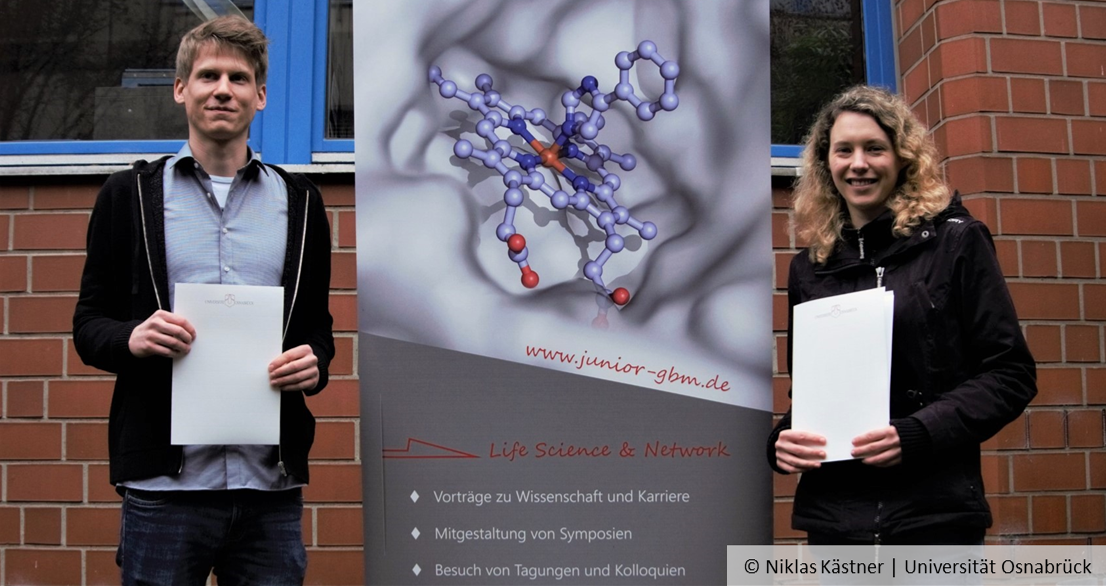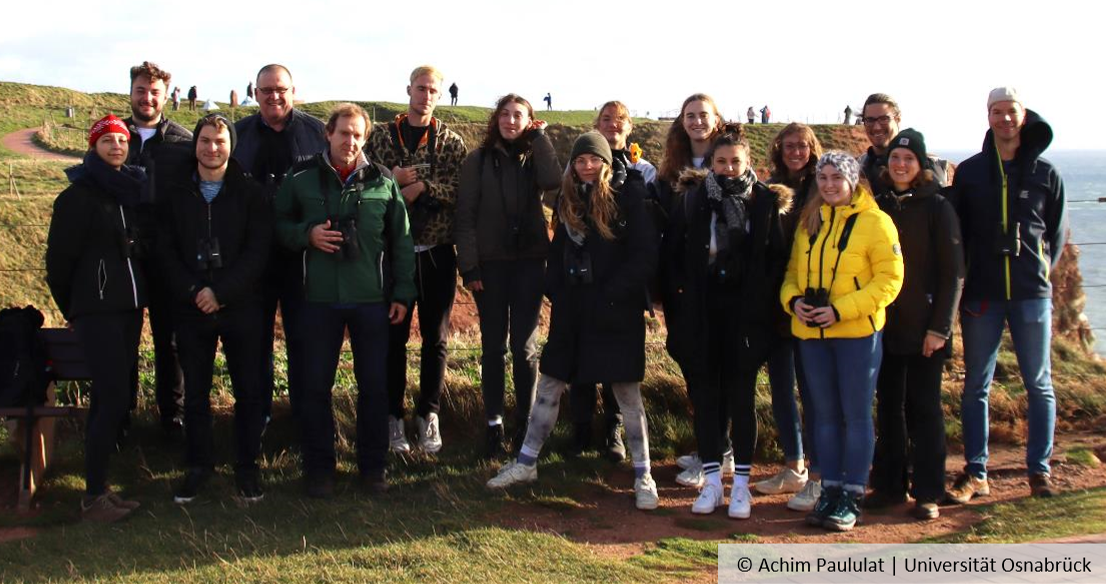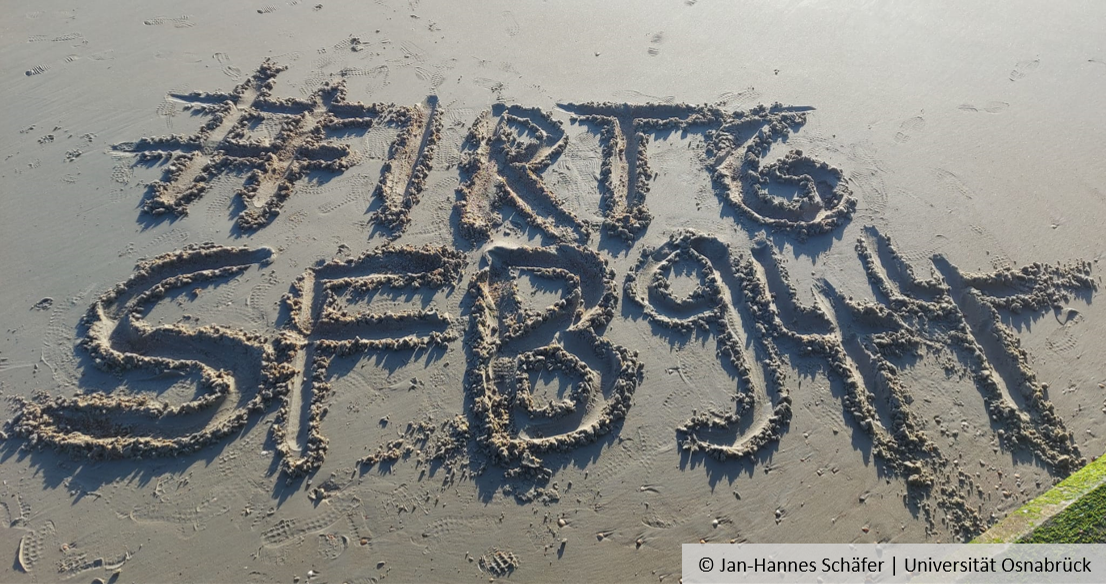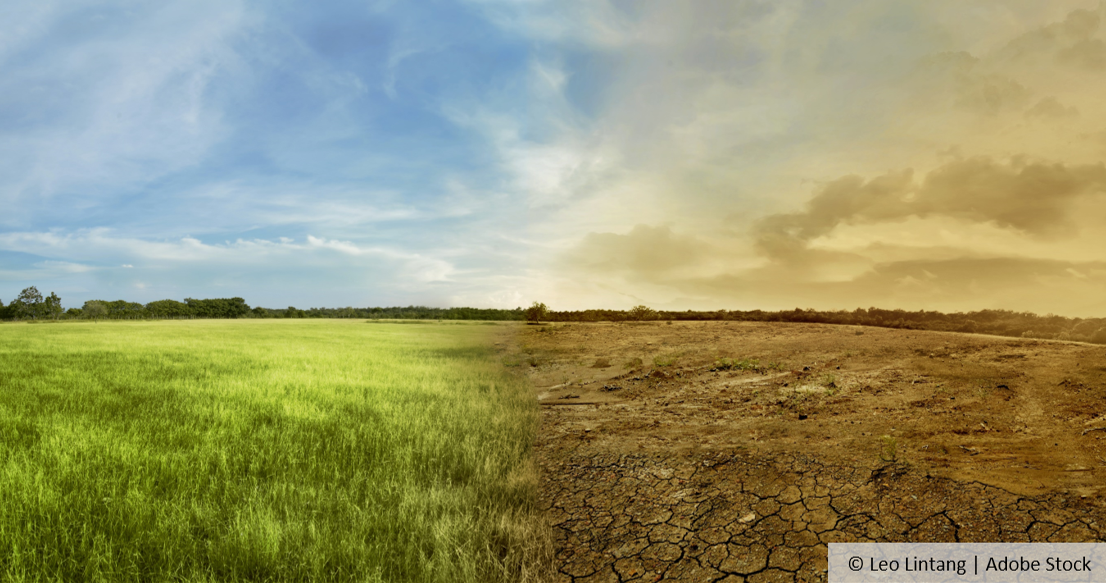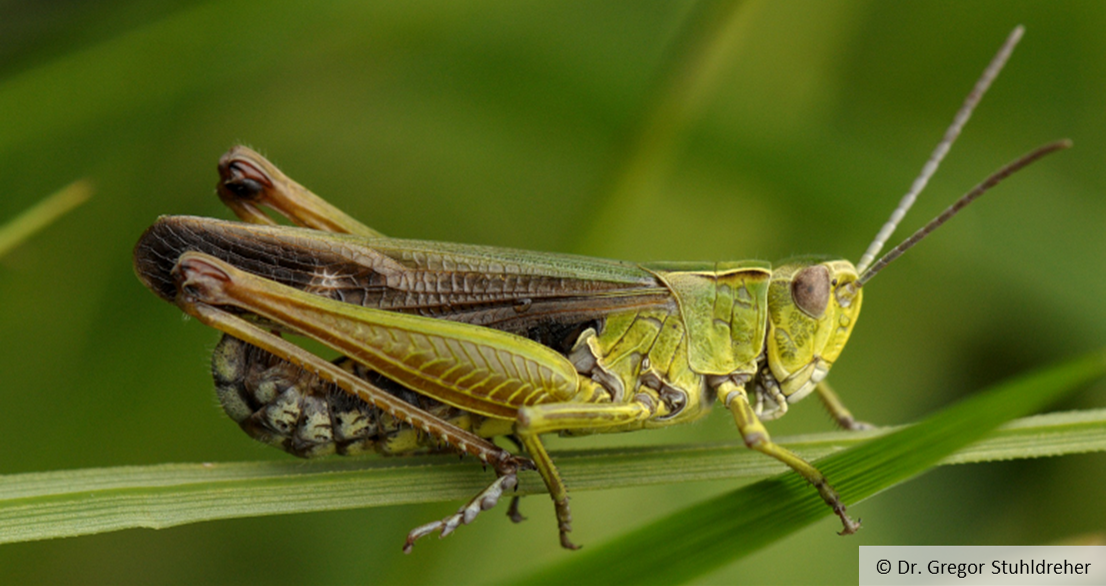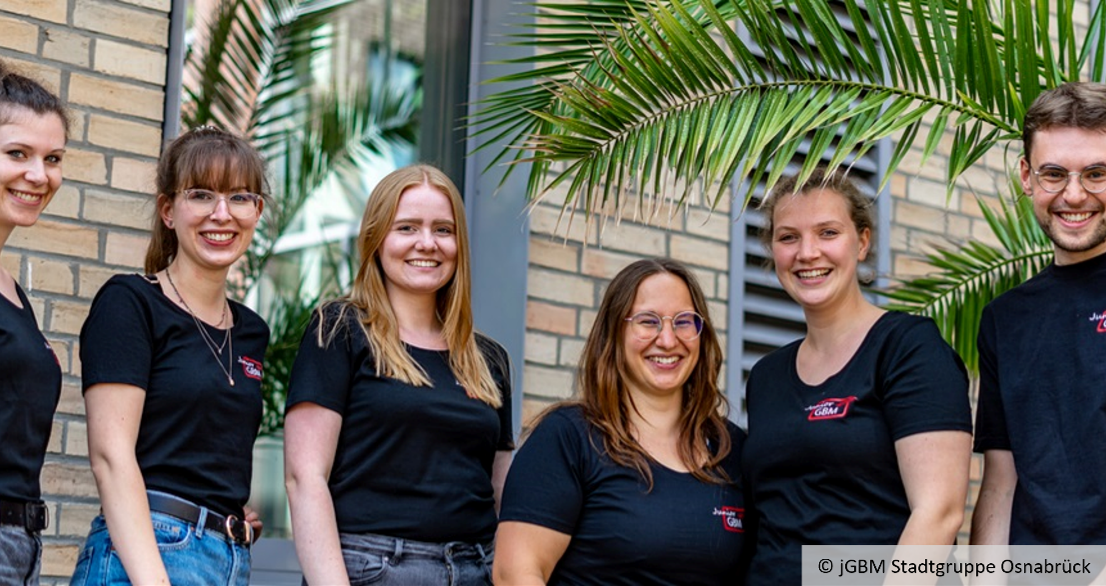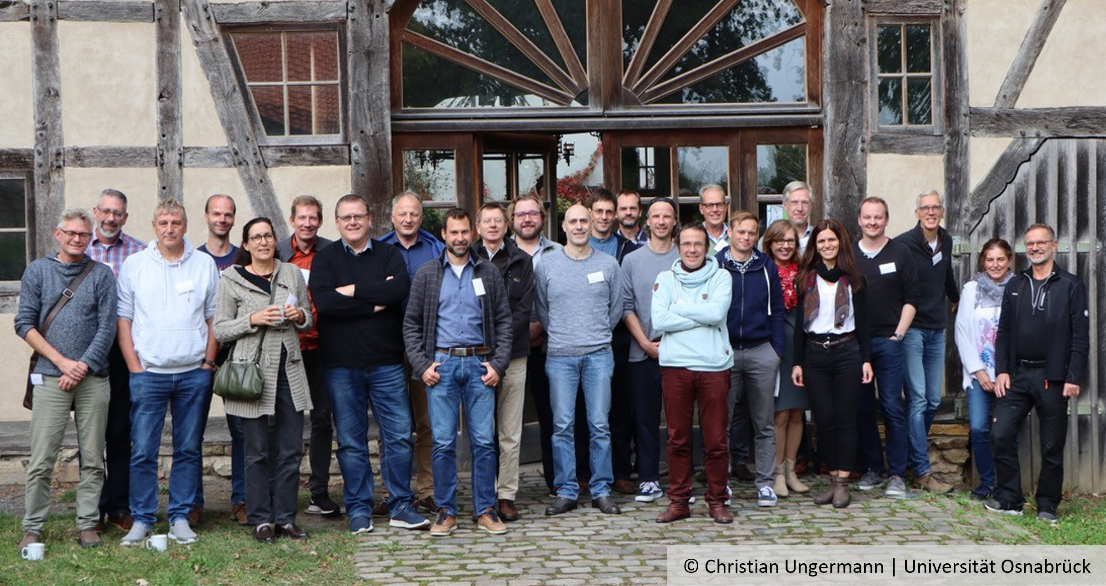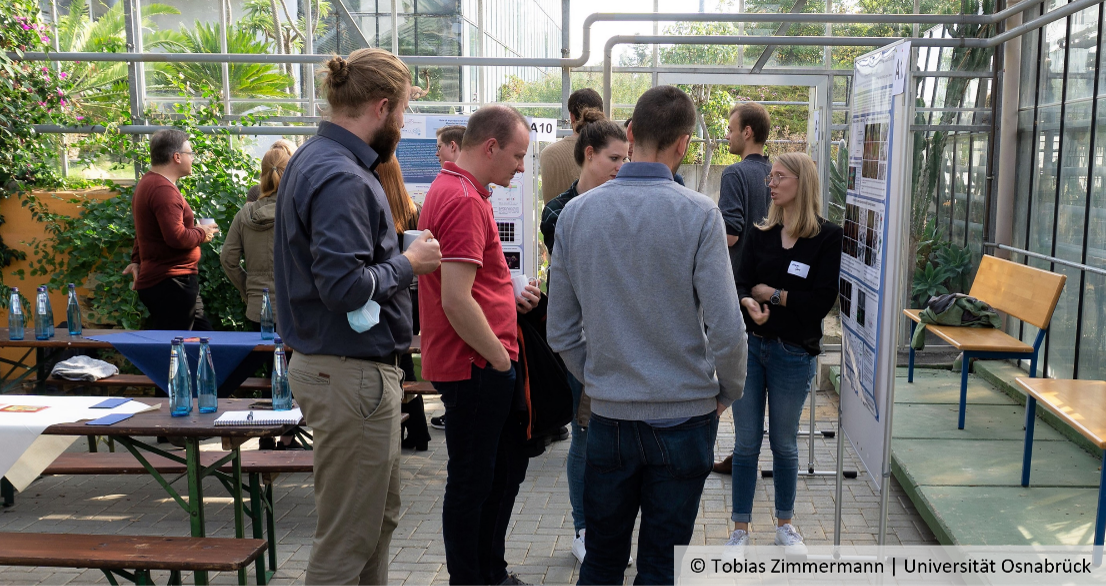Main content
Top content
News
Top content
From the Botanical Garden to the centre of top-level research: The amazing career of an Osnabrück liverwort
12.03.2025
The liverwort Marchantia polymorpha is found all over the world. By comparing specimens from different regions, scientists have the opportunity to obtain valuable information on how plants adapt to very different environmental conditions. As part of a study recently published in the renowned scientific journal ‘Nature Genetics’, an international team has now decoded the genetic material of representatives from over one hundred ecotypes of the liverwort. Among them: Prof. Dr. Sabine Zachgo - and Marchantia plants from Osnabrück University’s Botanical Garden.
Prizes for the best Master's theses in 2024 go to Bakeeran Pathmalolan and Kevin Tanzusch
10.02.2025
Osnabrück Biology has once again honoured the best Master's theses of the previous year: this year, the Dean's Prize went to Bakeeran Pathmalolan and the Prize of the Society for Biochemistry and Molecular Biology (GBM) to Kevin Tanzusch. The awards were presented by the Dean, Prof. Dr. Roland Brandt, on 29 January as part of the department's New Year's reception.
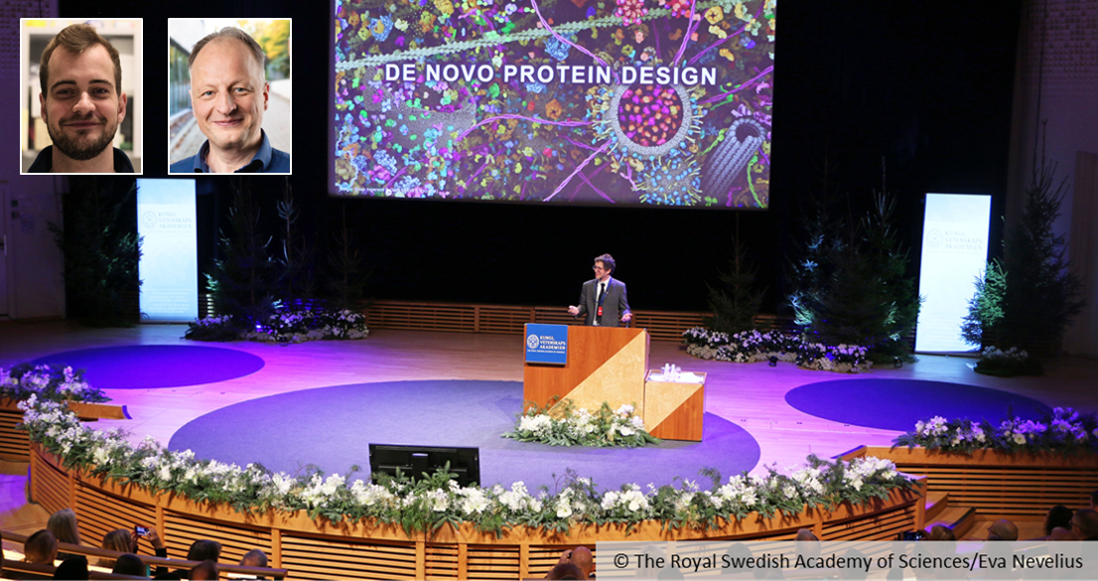
Great honour for Osnabrück biophysicists: Cooperation project prominently featured in Nobel Prize lecture
18.12.2024
On 8 December 2024, David Baker accepted the Nobel Prize for Chemistry in Stockholm. In his speech, he gave an insight into his ground-breaking research on protein design. In the course of his talk, he referenced a current project in which two scientists from Osnabrück University were involved: Group leader Prof. Dr. Jacob Piehler and PhD student Christoph Pollmann from the Biophysics group. We are delighted about this special testimony to the excellence of Osnabrück Biology’s research and congratulate the two researchers warmly!
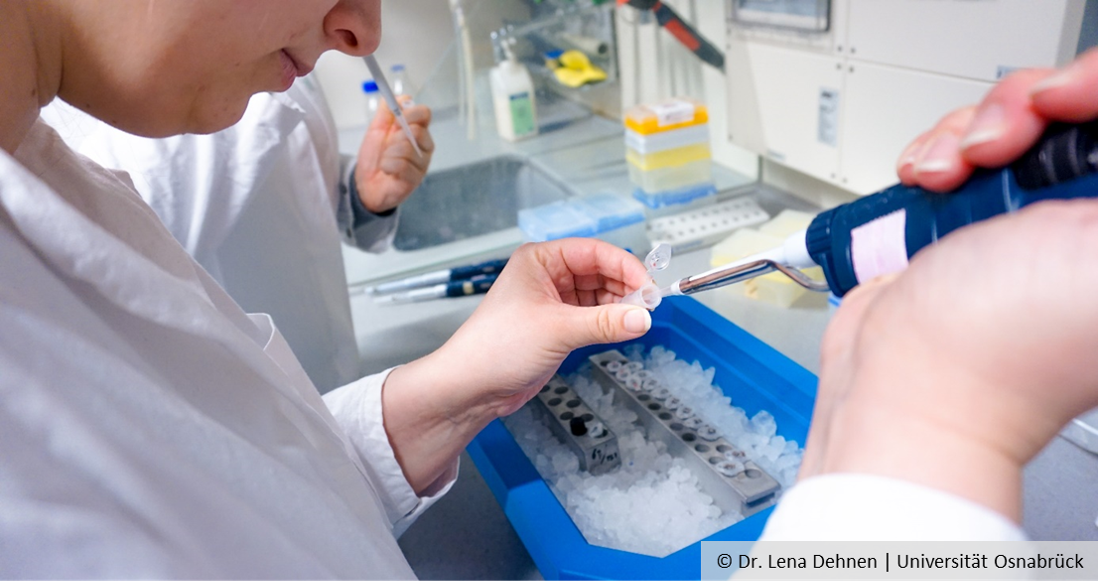
Success in acquiring third-party funding: Life sciences at Osnabrück University among the frontrunners in a national comparison
02.12.2024
Researchers at Osnabrück University in the field of life sciences have been particularly successful in acquiring funding in recent years: In the DFG Funding Atlas for 2020 to 2022, the university was ranked 7th in relation to the number of professors and 3rd in relation to the number of researchers compared to other German universities. One of the contributing factors to this remarkable success is the research achievements of the Collaborative Research Centre 944 and the CellNanOs.
Important role in the lipid metabolism of cells: Osnabrück Biology team uncovers enzyme structure
02.12.2024
Lipids fulfil various functions in cells. They are important components of cell membranes, act as energy stores or signal transducers and are building blocks for various cellular structures. In a recent study, researchers from Osnabrück Biology have decoded the structure of a key enzyme in the lipid metabolism of yeast cells: ceramide synthase.
Is studying biology something for me? What the University Information Day 2024 was like
27.11.2024
Osnabrück University's annual information day took place on 21 November. Once again, the Biology unit offered all interested pupils a range of information lectures, hands-on stands, guided tours of the Center for Cellular Nanoanalytics (CellNanOs) and taster lectures to find out more about research and teaching here.
Multicellular signaling dynamics: Lena Tveriakhina heads new junior research group
27.11.2024
Osnabrück Biology is pleased to welcome a new group leader: Dr. Lena Tveriakhina, who previously conducted research at Harvard Medical School and the Medizinische Hochschule Hannover, will head the junior group "Multicellular Signaling Dynamics" in Osnabrück. Her work will focus on the question as to how the dynamics of signaling influence the fate of cells in multicellular organisms.
Excursion to the oldest zoo in the world: What does species-appropriate animal husbandry look like, and how can it be ensured?
12.11.2024
Under the guiding theme "Modern Animal Husbandry Concepts”, a three-day excursion organized by the Behavioural Biology research group (led by Prof. Dr. Chadi Touma) took place in September. The program included visits to the Schönbrunn Zoo – the oldest zoo in the world – as well as to the Research Institute for Wildlife Ecology and Wildlife Management at the University of Veterinary Medicine Vienna.
Plenty of room for professional exchange: Retreat of the Integrated Research Training Group in Dortmund
12.11.2024
This year's retreat of the Collaborative Research Centre’s Integrated Research Training Group took place in Dortmund from 21 to 23 October. In a relaxed atmosphere, the meeting offered the approximately sixty participating PhD students, postdocs and principal investigators plenty of space to discuss current research projects.
From dunlin to little bunting: students discover almost eighty bird species on Heligoland excursion
11.11.2024
In October, 18 students said: ‘Off to the island’. Together with their lecturers from the Zoology research group, they went on an ornithological excursion to Heligoland. Equipped with binoculars and spotting scopes, the group spent several days on the North Sea island and were able to observe a total of 79 bird species up close - including some species that are rarely seen.
From the beach to the roof top: Osnabrück Biology researchers investigate the breeding behaviour of oystercatchers
07.11.2024
Due to climate change and other human influences, many bird species are losing their habitats. However, some of them are finding new breeding grounds in unusual places. A new study by a team led by Dr. Franz Löffler and Prof. Dr. Thomas Fartmann (Biodiversity & Landscape Ecology group) shows that urban flat roofs near football pitches provide good breeding sites for the endangered oystercatcher – with up to five times higher breeding success than in the wild.
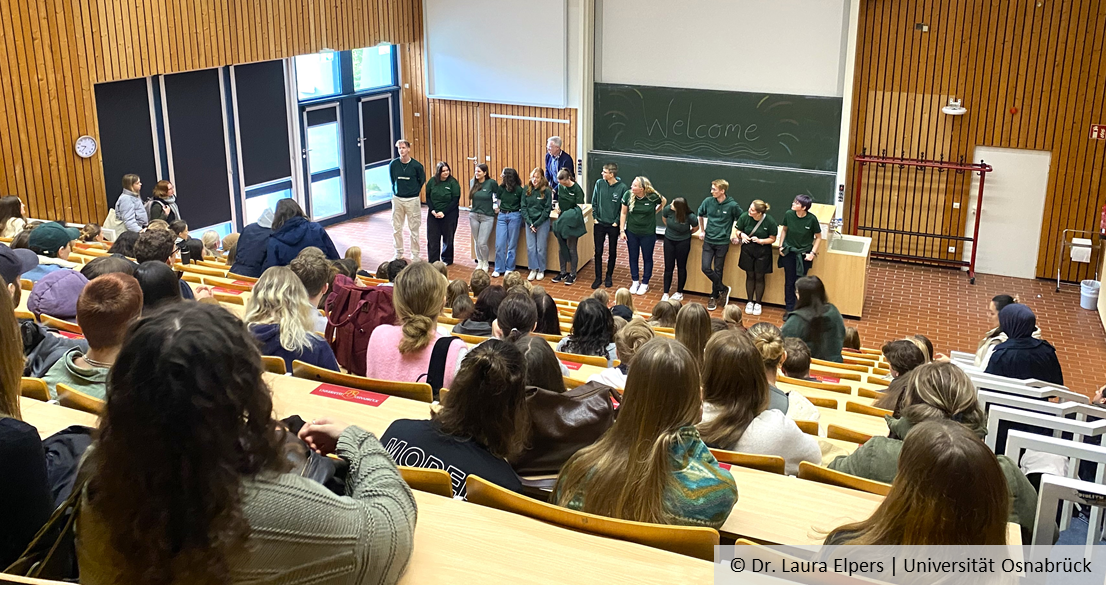
First cohort after reorganisation: Osnabrück Biology welcomes its new Bachelor's students
05.11.2024
About 200 first-semester students began their biology degree programme at Osnabrück University at the end of October. This is a special year: it is the first cohort to benefit directly from the reorganisation of the single-subject Biology Bachelor of Science degree programme. We would like to welcome all new Bachelor students to Osnabrück and wish them a successful start to their studies!
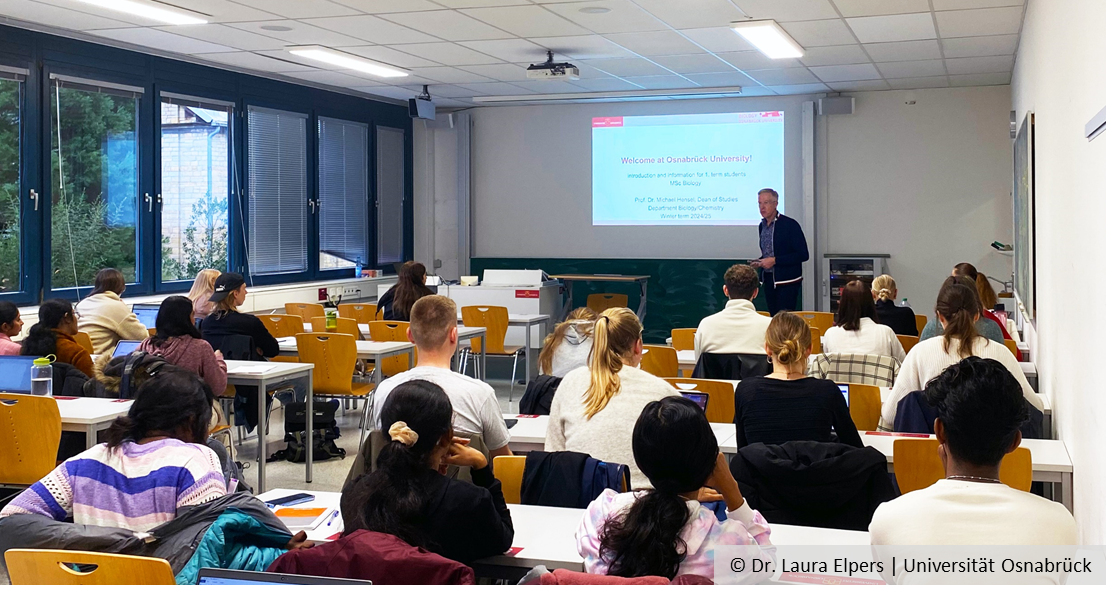
Welcome to Osnabrück! The Biology unit welcomes its new Master's students
05.11.2024
This winter semester, Osnabrück Biology welcomes 59 new students on the Master's degree programme „Biology“ and 38 on the Master's degree programme „Nanosciences“. Some of them have already completed their Bachelor's degree in Osnabrück, but there are also many new faces. Particularly noteworthy: the proportion of international students this year is more than 70 per cent. We wish all students a successful degree programme!
New international Master’s in Membrane Biology: Studying in Nice, Genoa and Osnabrück
19.09.2024
A team of Osnabrück biologists, together with cooperation partners from France and Italy, has succeeded in securing funding from the Erasmus Mundus Joint Masters program to launch an innovative international master program. This means, future students will have the opportunity to follow a fully integrated training program focusing on interdisciplinary research in membrane biology at three sites in three European countries.
Finding the right rhythm – Osnabrück developmental biologists receive DFG funding for heart research
12.09.2024
How does the heart adjust its rhythm to changing physical demands? A team led by PD Dr Heiko Harten will be investigating this question in more detail in future as part of a DFG-funded project. In particular, the researchers want to investigate whether a molecular mechanism that they have previously discovered in the fruit fly Drosophila melanogaster also plays a decisive role in the human heart.
Multiprotein complexes governing chlorophyll biosynthesis: Dmitry Shvarev heads new junior research group
10.09.2024
Osnabrück Biology is pleased to welcome a new principal investigator: Dr. Dmitry Shvarev, who previously conducted research as a postdoc in the Structural Biology group, will in future head the junior research group“Structural Biology of Photosynthetic Microorganisms“, funded by the DFG's Emmy Noether Programme. His aim is to understand the function of multiprotein complexes that control and regulate chlorophyll biosynthesis.
When cells sacrifice themselves: New insights into molecular processes in programmed cell death
21.08.2024
When cells are infected with pathogens, they sometimes initiate their own demise, triggering a strong immune response. In this process, known as "pyroptosis", the formation of pores in the cell membrane plays a decisive role. These are formed by Gasdermin proteins by an unknown mechanism. Researchers at Osnabrück Biology, led by Prof. Dr. Katia Cosentino, have now unravelled the precise mechanism how these proteins target the cell membrane and work together to form these tiny lethal pores. Their findings have been published in "The EMBO Journal".
Chemical biology of membranes: Denisa Jamecna heads new junior research group
07.08.2024
The Biology department is pleased to welcome a new member: Dr. Denisa Jamecna, who previously conducted research at the University of Heidelberg, will head the junior group "Chemical Biology of Membranes" in Osnabrück. Her work will focus on the question as to how cells regulate the composition of their lipids in order to maintain cell function.
Perspectives of Molecular Neurobiology: 11th Westerberger Herbsttagung
26.07.2024
On Friday, September 27, 2024, the traditional “Westerberger Herbsttagung” will take place in its 11th edition in the CellNanOs building. This year’s topic is "New Approaches to Study Neurons". Participation in the event is free and registration is now open.
Handover in the Scientific Advisory Board of the Alzheimer's Research Initiative: Roland Brandt takes over as chairman
26.07.2024
The “Alzheimer Forschungsinitiative” (AFI) is the largest private sponsor of Alzheimer's research in Germany. Since its foundation in 1995, it has distributed over 16 million euros for research. From next year, Prof. Dr. Roland Brandt (RG Neurobiology) will take over the chairmanship of the initiative's Scientific Advisory Board.
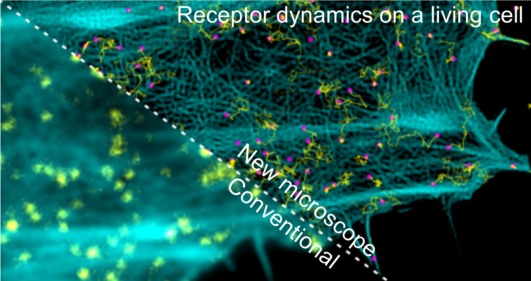
Cellular dynamics at the highest resolution: Scientists at CellNanOs develop new microscope
19.07.2024
Scientists at the Integrated Bioimaging Facility (iBiOs) at CellNanOs and the Biophysics group have developed a correlative microscope method that allows the simultaneous imaging of molecular interactions and their nano-environment in living cells with very high temporal and spatial resolution. The new method enables, for example, the analysis of immune receptor dynamics on the cell (see image), which move in complex membrane systems that are in turn linked to the cytoskeleton (actin). The researchers led by Prof. Dr. Jacob Piehler and Dr. Rainer Kurre combined two high-resolution microscopy techniques to create a unique new system. They have now presented their new method in the renowned journal “Nature Communications”.
Science for a future worth living: Exhibition in the Botanical Garden
17.05.2024
How can light energy be converted into chemical energy with the help of metal complexes? How do plants adapt to different environmental conditions? And what can we learn from mice about depression? Questions like these are the focus of a poster exhibition in the Botanical Garden, in which the various research groups in the School of Biology/Chemistry offer an insight into their diverse research from May to October.
Heart research in fruit flies: DFG funding for RG Zoology
16.05.2024
The fruit fly Drosophila melanogaster measures just two and a half millimetres - and its heart is only the size of a pinhead. This tiny organ is the focus of a research project by the RG Zoology (head: Prof. Dr. Achim Paululat), which is being funded by the German Research Foundation with a postdoctoral position and material resources. Specifically, the researchers are investigating the development and function of heart valve cells.
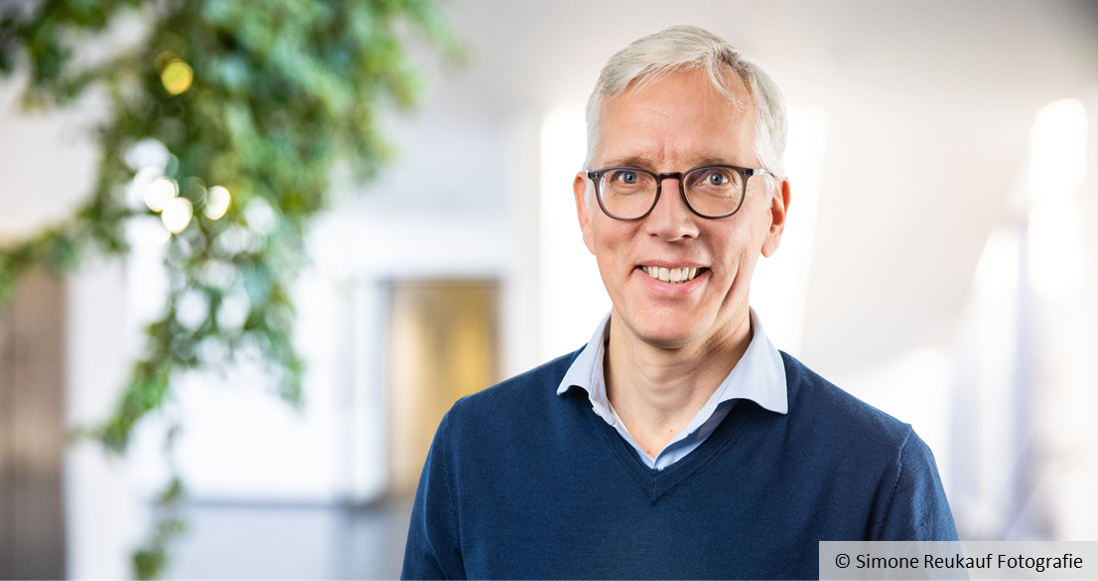
Biochemist Christian Ungermann elected as member of the Leopoldina National Academy of Sciences
26.04.2024
Founded in 1652, the „German National Academy of Sciences Leopoldina e. V.“ is the oldest academy of science in the world that has existed without interruption. As Germany's National Academy of Sciences, it advises politicians and the public on scientific issues and represents German academia on international committees. Admission to this society follows scientific excellence and is thus a very special honour – which has been awarded to Prof. Dr. Christian Ungermann, head of the Biochemistry section. He will be the only scientist from Osnabrück University at the Leopoldina.
Experiencing the tropics up close: lecture and exhibition in the Botanical Garden
09.04.2024
What are the tropics, how does their immense diversity come about and how are the organisms adapted to the different living conditions? Apl. Prof. i. R. Dr. Klaus Mummenhoff will talk about questions such as these on Thursday, 18 April at 6 pm in the Helikoniensaal of the Bohnenkamp House in the Botanical Garden. The lecture opens a new exhibition in the "Regenwaldhaus", where Sebastian Holt will present nature photographs from Costa Rica.
Professional exchange in a historic setting: International conference on development and regeneration in Osnabrück
27.03.2024
The annual conference of the German and Dutch societies for developmental biology (GfE & DSDB) took place in the Osnabrück castle from 12 to 15 March 2024 under the motto "Development and Regeneration". The programme included presentations by 53 researchers from Germany and abroad – including Nobel Prize winner Prof. Dr. Christiane Nüsslein-Volhard.
What helps in the fight against Alzheimer's? New method allows research in living cells
27.02.2024
Alzheimer's disease affects millions of people worldwide - and the numbers are rising. The interest in researching effective drugs is correspondingly high. A team led by Osnabrück biologist Prof. Dr. Roland Brandt (RG Neurobiology) has now developed a method that makes it possible to identify promising substances in living cells. The work has been published in the prestigious scientific journal "Nature Communications".
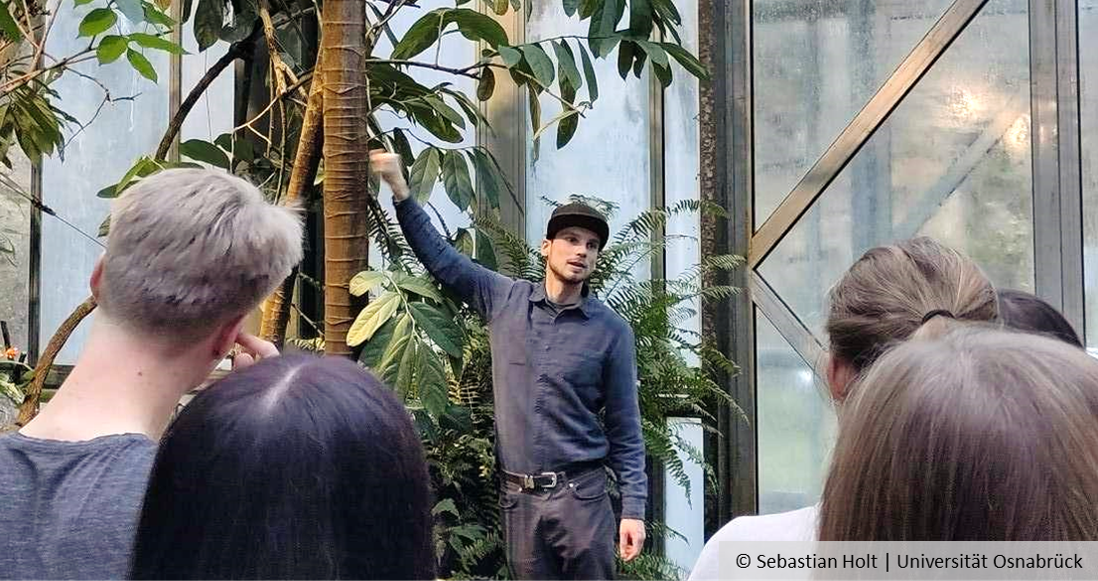
The Lower Saxony State Seminar of the International Biology Olympiad hosted in Osnabrück
09.02.2024
On January 11 and 12, the Department of Biology/Chemistry hosted the Lower Saxony state seminar for the third round of the International Biology Olympiad. A varied programme awaited the twelve participating students, including a guided tour around the Center for Cellular Nanoanalytics (CellNanOs), a visit to the Botanical Garden's rainforest house and plenty of time to get hands-on in the Explain-OS student laboratory.
Learning about adaptation from bryophytes: DFG funds priority programme for a further three years
05.02.2024
As part of a joint project, Prof. Dr. Sabine Zachgo, Dr. Felix Althoff and Lara Canova from the RG Botany investigate how plants adapted to life on land. The findings are particularly valuable with regard to current climate change – because its effects also confront plants with drastically altered environmental conditions. The good news: The German Research Foundation is funding the priority programme for a further three years.
Throwback at the New Year's event: These were the best Master's theses of 2023
01.02.2024
Osnabrück Biology awarded prizes for the three best Master's theses of the previous year in the categories "biochemical-molecular" and "organismic" as part of its New Year celebrations. The prizes were donated by the Biology department and the Society for Biochemistry and Molecular Biology (GBM). We warmly congratulate Kai, Fabio and Sabrina!
World’s Top 2 % Scientists: Osnabrück Biology researchers are among the most cited in their fields
30.01.2024
How influential the work of scientists is can be seen, among other things, by how often it is taken up in the scientific community. In order to create comparability in this respect, a team led by John Ioannidis from Stanford University regularly publishes a standardised list in Elsevier with the most frequently cited researchers. The current edition includes ten names of current and former Osnabrück Biology researchers.
From the lecture hall to the savannah: Master's students on an excursion in South Africa
29.01.2024
In the summer semester of 2023, twelve master's students from Osnabrück Biology travelled to South Africa as part of the excursion module in Behavioural Biology. Led by Prof. Dr. Chadi Touma, the group spent two weeks exploring the "Mammal Research Institute" at the University of Pretoria, the "Mogalakwena Research Centre," the "Pilanesberg National Park," and the "Ukutula Conservation Centre".
Big number for the new year: the learning lab welcomes its 15,000th pupil
21.01.2024
Osnabrück Biology set a new record right at the start of the year: The now 15,000th student has taken part in a course at the experimental teaching-learning laboratory "Explain-OS" under the direction of PD Dr. Knut Jahreis. This means that the learning laboratory has now been an essential extracurricular learning location in the greater Osnabrück area for 16 years.

Double success: Achim Paululat and Jacob Piehler elected to DFG review boards
28.11.2023
Every four years, around 150,000 researchers decide on the appointment of the review boards of the German Research Foundation (DFG). The members of these committees decide on grant proposals and are involved in the further development of funding programmes. Over the next four years, once again two Osnabrück biology researchers will be represented there: Prof. Dr. Jacob Piehler was newly elected to the "Fundamentals of Biology and Medicine" review board and Prof Dr. Achim Paululat was elected to the "Zoology" review board for a second term. We congratulate them warmly!
A taste of university spirit and plenty of information: The HIT 2023 at Osnabrück Biology
24.11.2023
On November 23, it was that time again: the university information day (HIT) invited interested pupils to find out more about biological research and teaching at Osnabrück University. Participants were offered a varied program of information lectures, hands-on and experimental stands as well as guided tours around the state-of-the-art CellNanOs research building.
Podcast on "restoration artists": Kerstin Bartscherer talks about tissue regeneration in animals
10.11.2023
Spiny mice can close wounds without scarring, axolotls can rebuild their limbs - and some flatworms can even regrow their heads. These abilities are not only fascinating, but also of great interest to medicine. In the podcast „radioWissen“ by Bayerischer Rundfunk, Prof. Dr. Kerstin Bartscherer (RG Animal Physiology) talks about the molecular basis of tissue regeneration and her own research on the subject.

Genetic studies on thale cress lead to success in "Jugend forscht" competition
05.10.2023
The inconspicuous Arabidopsis thaliana is the central model organism in molecular plant sciences and plays an important role in biology as a model organism. Under the supervision of Prof. Dr. Nico Dissmeyer (RG Plant Physiology), three young junior scientists have now been working on the plant's genetic makeup since mid-2022 – with great success. With their investigations into the function of a gene family with completely unknown functions, the team of Vincent Xigu Liu from Meppen, Anton Jakob Goldbach from Bad Zwischenahn, and Leonard Kerem Kottisch from Oldenburg won at the regional level in "Jugend forscht" and subsequently achieved second place in the 2023 state competition. We warmly congratulate them!
Scar-free wound healing: New study on the molecular genetic basis of tissue regeneration
21.09.2023
How do spiny mice restore injured tissue and close wounds without leaving a scar? This question has been on the agenda of researchers ever since the rodents' special ability was first described about ten years ago. In a recent study, a team led by Osnabrück animal physiologist Prof. Dr. Kerstin Bartscherer took a closer look at the molecular basis of regeneration in the animals.
Scientific exchange in summery weather: First international symposium of the Collaborative Research Center 1557
18.09.2023
On September 6th and 7th, the first symposium of the Collaborative Research Center 1557 "Functional plasticity encoded by cellular membrane networks" took place in Osnabrück. In summery temperatures, about 100 participants met in the Bohnenkamp House of the Botanical Garden for scientific exchange. Following the kick-off meeting of the PhD students in May, it was the first event of the research network launched in January with an international audience.
Molecular mechanisms of ceramide biosynthesis: Florian Fröhlich receives funding from the Boehringer Ingelheim Foundation
13.09.2023
Great success for Prof. Dr. Florian Fröhlich (AG Bioanalytical Chemistry): As part of the Rise up! program, he receives funding of almost 600,000 euros from the Boehringer Ingelheim Foundation. The funded research project aims to decipher the molecular mechanisms and regulation of ceramide synthases – enzymes that play an important role in cellular lipid metabolism.
Finding your way through the journal jungle: position paper offers guidance
30.08.2023
At the end of a scientific investigation stands the publication of the results in a scientific journal. However, the number of journals has increased massively in recent years – and not all of them are of high quality. Members of the DFG Review Board 203 Zoology have addressed this problem in a position paper, in which they also offer guidance in the selection of a high-quality journal.

Taster lectures, guided tours and interactive booths: This was the Night of Biology
03.07.2023
On June 22, the second Night of Biology took place at our department and offered pupils a variety of insights into biological research and teaching. In addition to lectures and guided tours, the participants had various opportunities to get active themselves: For example, they could load a protein gel, examine fruit flies - or compete in pipette tip shooting at the Lab Olympics.
Hans Mühlenhoff Prize for good academic teaching awarded to two Biology lecturers
16.06.2023
At this year's Hans Mühlenhoff Award for excellent academic teaching, Prof. Dr. Chadi Touma (RG Behavioral Biology) and Dr. Dominique Remy (RG Ecology) were awarded special honors. They were nominated by the students of the Osnabrück University and finally selected as award winners by a student jury chaired by the Vice President for Academic Affairs, Prof. Dr. Jochen Oltmer, for their special commitment to teaching. The department congratulates very cordially!
Morphology and evolution of multicellular animals: new zoology textbook by Osnabrück Biology researchers
31.05.2023
In the course of evolution, multicellular animals or "metazoa" have colonised almost all habitats on our planet. In a new textbook, the Osnabrück biologists Achim Paululat and Günter Purschke (RG Zoology) show, with the help introductory texts and almost 500 photos, how animals are structured, which organs they possess and how the species, so different at first glance, are related to each other in evolutionary terms.
Getting to know each other: kick-off meeting of the Research Training Group of our new Collaborative Research Centre
30.05.2023
The PhD students of the new Collaborative Research Centre 1557 "Functional Plasticity Encoded by Cellular Membrane Networks" recently had plenty of time for exchanging ideas and getting to know each other. During a three-day kick-off meeting of the Integrated Research Training Group, exciting lectures and workshops as well as joint activities were on the agenda - including a visit of an alpaca farm.
Nanomaterials meet membrane biology: Interdisciplinary research training group granted
09.05.2023
Great success for CellNanOs researchers: the German Research Foundation (DFG) will fund the research training group "nanomaterials@biomembranes" with 6.9 million euros starting in October 2023. The initiative supports PhD projects at the interfaces of nanomaterials synthesis, chemical surface functionalization, and membrane biochemistry and biophysics - and offers "outstanding opportunities to qualify for interdisciplinary research fields that are currently emerging between biology, chemistry, and physics," says the consortium's designated spokesperson, Prof. Dr. Jacob Piehler.

Excursion to the Gülper Lake and the Havelland Luch: Eagles, bustards and hoopoes
08.05.2023
Once again this year, Osnabrück Biology students explored the wildlife at 'Gülper See' (Gülpe Lake) as part of an excursion by the research group Zoology-Developmental Biology (head: Prof. Dr. Achim Paululat). They spotted not only many impressive birds, but also some bats. The starting point for all daily observation tours was the Ecological Station of the University of Potsdam in Gülpe.
Wound healing without scarring: A molecular switch activates tissue regeneration
02.05.2023
Spiny mice possess an extraordinary ability for mammals: they can repair injured tissue without forming scars. A joint study by researchers led by Prof. Kerstin Bartscherer (AG Animal Physiology) and Prof. Ashley Seifert (University of Kentucky) provides new insights into the molecular basis of this phenomenon - which could one day prove valuable for the treatment of human diseases.
New offer for biology students: Borrow equipment for birding
23.03.2023
Biology students can borrow a backpack with binoculars, spotting scope, identification book and other small tools from the research group Zoology (Head: Prof. Dr. Achim Paululat): "Use suggested routes or plan your own tour. Borrowing a backpack is easy: just send us an email with your name, matriculation number and the date you would like to borrow it, then pick up the backpack - and off you go."

Mastersymposium: How to design and present a scientific poster
22.03.2023
As part of the introductory module, the traditional "Mastersymposium" took place last week. For this occasion, the master students designed their own scientific posters, which they presented to the audience. The prize for the best poster this year went to Jana Milach and Badis Gazbar.
Gorillas, pandas and co. – Animal welfare oriented behavioural biology excursion to two modern European zoos
16.03.2023
Modern animal husbandry concepts were the subject of a three-day excursion offered for the first time by the Behavioural Biology group. Under the supervision of Dr. Oliver Ambrée, Prof. Dr. Chadi Touma and apl. Prof. Dr. Michael Böer, the 14 participating students visited two zoological gardens - one in the Netherlands and one in Belgium.

Insights into the social life of bacteria: Shiksha Ajmera wins science slam
10.02.2023
A science slam is about presenting scientific findings in a generally understandable way and with a touch of humor. At an event organized by PhD InterConnect, Shiksha Ajmera from the Ecology group (head: by Prof. Dr. Christian Kost) recently spoke about her research on bacterial communities - and won.

Acceptance of insect-based food: Jacqueline Dupont interviewed by Tagesschau24
03.02.2023
"Eating mealworms for climate protection?" This is the title of a program on Tagesschau24, in which Jacqueline Dupont from the Biology Didactics group (head: Dr. Florian Fiebelkorn) was featured as an expert last Thursday. She spoke about the acceptance of novel foods, especially those that are insect-based - a topic she is currently addressing as part of her doctorate.

Digital field trip: Costa Rica's diverse ecosystems as a virtual experience
02.02.2023
For twenty years, apl. Prof. Klaus Mummenhoff from the Botany group has regularly taken students to Costa Rica - a country that, despite its modest size, boasts an enormous diversity of ecological life zones. Together with Felix Przesdzink and Sebastian Holt, he has now digitized this experience.
Vanilla under the microscope: workshop as part of the “International Biology Olympics”
30.01.2023
Making plant sections and examining them under the microscope: Among other things, this was part of a workshop at Osnabrück Biology at the end of January, during which the participating students from Lower Saxony were offered a variety of insights into biological teaching and research.
Outstanding research on biodiversity in grasslands: Franz Löffler's doctoral thesis receives several awards
16.01.2023
The global decline in biodiversity has reached alarming proportions. Scientific studies on the causes of biodiversity loss are therefore more important than ever. Osnabrück biologist Dr. Franz Löffler received several research awards last year for his research in this area.
Great honor: Osnabrück University researchers elected to the board of developmental biology society
13.01.2023
In the future, two researchers from Osnabrück University will be steering the fortunes of an important bioscientific society: The members of the “Gesellschaft für Entwicklungsbiologie” elected Prof. Dr. Kerstin Bartscherer as the new chairperson and Prof. Dr. Achim Paululat as a member of the board.

Awards for the best master theses go to Julia Seimert and Melanie Trupp
21.12.2022
Again this year, two former Osnabrück Biology master students were honored for their theses. Julia Seimert received the award in the category “thesis with a focus on biochemistry/molecular biology” and Melanie Trupp in the category “thesis with a focus on organismal biology”.
Cutting-edge research at Osnabrück Biology: DFG approves Collaborative Research Center
25.11.2022
The University of Osnabrück is receiving more than 11.5 million euros from the German Research Foundation (DFG) for the new Collaborative Research Centre 1557 "Functional plasticity encoded by cellular membrane networks". The DFG is thus funding the joint research of numerous young scientists around the biochemist Prof. Dr. Christian Ungermann.
Latest research: Habitat heterogeneity promotes bird diversity in semi-natural grasslands
23.11.2022
Which factors determine the diversity of breeding birds in semi-natural grasslands? This was the question behind a recent study by researchers from Osnabrück Biology. Their main finding: The heterogeneity of the grasslands is of particular importance for bird abundance and species richness.

Guided tours, lectures and hands-on booths: The university information day 2022
22.11.2022
Should I study biology? Numerous students took the opportunity to get a little closer to answering this question at this year's “Hochschulinformationstag”. Various information events offered participants a wide range of insights into biological research and teaching in Osnabrück.
Spectacular insights into the cell's stomach
02.11.2022
How do cells transport ingested food items or viruses such as the coronavirus SARS-CoV2 to the cellular stomach and break them down? This was the question behind a recent study of a research team led by scientists from Osnabrück Biology. Using state-of-the-art microscopy technology, they unravelled the 3D structure of the HOPS complex, which plays a central role in this process.
Novel foods: Florian Fiebelkorn talks about insects and cultured meat as protein sources of the future
16.09.2022
The museum of industrial culture Osnabrück is currently running the special exhibition "Future Food. Essen für die Welt von Morgen". On Wednesday, September 21, at 6 p.m., Dr. Florian Fiebelkorn, head of the Biology Didactics research group, will speak about the advantages of insects and cultured meat as valuable protein sources for sustainable food security in the future.
Outstanding fly portrait: Osnabrück student wins international photo competition
09.09.2022
With his photo of a fly's head, Kai Jürgens won the international image competition of the electron microscope manufacturer JEOL in August - and is thus also in the running for the picture of the year. The impressive image was taken as part of his master's thesis in the Zoology group under the supervision of Prof. Dr. Achim Paululat.
Latest research: keeping the heart in the right rhythm
22.08.2022
How does the heart keep its rhythm? This question was the focus of an investigation led by Dr. Heiko Harten from the Zoology research group. The researchers discovered that the enzyme "Neprilysin 4" plays a decisive, hitherto unknown role in this process. The results were published in the journal "Nature Communications".
Perspectives of Molecular Neurobiology: Invitation to the 10th Westerberger Herbsttagung
09.08.2022
On Thursday, Sept. 29, 2022, the 10th Westerberger Herbsttagung will be held in the CellNanOs building. The topic this year is "Membranes and the Cytoskeleton in Health and Neurodegenerative Disease". Registration for the conference is now open.
Altruistic cell death in bacterial clusters: new research project
03.08.2022
The so-called „altruistic suicide“ of bacterial cells has been little researched so far. In a new joint project of researchers from Osnabrück Biology and Bielefeld University, the background of this phenomenon will be investigated in more detail. The German Research Foundation (DFG) is providing a total of around 500,000 euros for this purpose.
BestMasters Award: Maresa Temmen’s thesis published by Springer
20.07.2022
How is the acceptance of meat substitutes in Germany? Maresa Temmen addressed this question in her master's thesis, which she wrote under the supervision of Dr. Florian Fiebelkorn in the Biology Didactics group. In addition to the top grade, she received a special recognition for her work: the "BestMasters Award" from Springer combined with the publication of her results as a book.
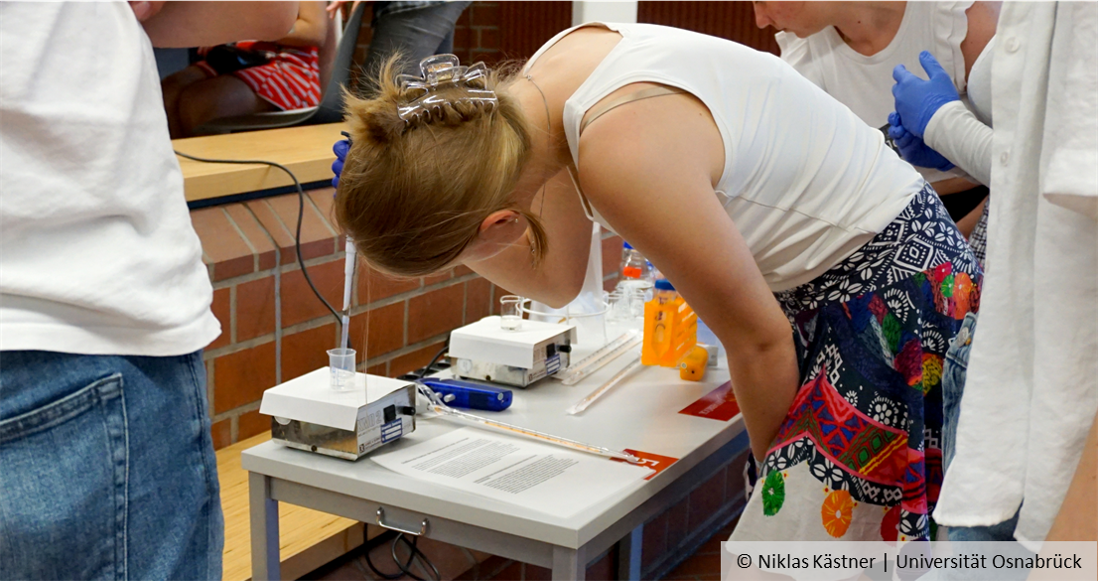
Lectures, experiments and lab olympics - the night of biology classes at our department
13.07.2022
Should I study biology? At the first "Nacht der Bio-LKs" on June 30, students had the opportunity to get a little closer to answering this question. Whether during lectures, in conversation with students and teachers, or by looking through a microscope - there were a variety of insights into biological research and teaching at the department.
Awards for good teaching: Two nominees from Osnabrück Biology
22.06.2022
How well is research integrated into the courses? Are modern media used sensibly? What about feedback and supervision? These are some of the criteria for the Hans Mühlenhoff Prizes for academic teaching. Prof. Dr. Katia Cosentino and Dr. Florian Fiebelkorn, two members of our department, were among the nominees this year.
Flies with four wings – and four wing hearts
15.06.2022
How many wings does a fly actually have? Their affiliation to the order "Diptera" gives it away – the answer is two. But there are exceptions: A mutation in a certain gene can cause flies to develop an additional pair of wings. In a recent study, researchers from Osnabrück Biology investigated how this anatomical peculiarity develops.
Campus life: New outdoor seats
08.06.2022
The recreational opportunities for students and staff in the area of the Biology building 35 have recently been expanded: The landscaped courtyard now features six pieces of comfortable wooden furniture. The area is accessible through the glass doors in the foyer, which will be open until early afternoon during the summer months.
On the trail of eagles: Excursion of the RG Zoology to the Gülper lake
29.04.2022
White-tailed eagles are among the largest predators in Europe, with a wingspan of up to 230 centimeters. As resident birds, the eagles remain in their territory all year round and hunt carp, brown hare, coots or gray geese. During a field trip with the Zoology-Developmental Biology research group, Osnabrück Biology students were now able to observe more than twenty specimens of the impressive animals.
Investment in teaching: New modern course microscopes for biology
29.04.2022
Bacteria, fungi, multicellular organisms of the animal and plant world - all of these can be analyzed in detail under the microscope during Biology courses at the University of Osnabrück. Investing around €100,000 in study quality funds, the department has now purchased 25 state-of-the-art microscopes, thus expanding the existing equipment in the biology course rooms.
New study: Majority would try cultured meat
20.04.2022
The Biology Didactics group at Osnabrück University has investigated the level of public acceptance of so-called cultured meat. The researchers have now published their findings in the journal "Foods". Cultured meat is produced outside a living organism from muscle stem cells. These are previously taken from a cow or pig and propagated.
"Klimawandel und Klimaschutz" - Scientists for Future lecture series
14.04.2022
On Wednesday, April 20, the sixth lecture series "Klimawandel und Klimaschutz" of the Scientists for Future regional group Osnabrück starts. Under the title "Ernährungssysteme gestalten: Wie wir gemeinsam die Wende schaffen", the first speaker will be Prof. Dr. Melanie Speck from the Faculty of Agricultural Sciences and Landscape Architecture at Osnabrück University of Applied Sciences. The lectures in the series take place every second Wednesday in lecture hall 01/E01 in Kolpingstraße 7, lectures start at 7 p.m., the 2G rule applies.
Rainforest House in the Botanical Garden reopens in April
30.03.2022
The Rainforest House at Osnabrück University's Botanical Garden will be open for visits again from April 2022. Previously, the popular excursion destination had to close its doors for the duration of almost two pandemic years. Now the signs point to a new beginning, announces the director of the Botanic Garden, Prof. Dr. Sabine Zachgo: "We are delighted that we can finally welcome visitors to our tropics in Osnabrück again. We cordially invite you to stop by and listen to the concert of the frogs!"
Underrated animals: Zoologists from Osnabrück and Vechta provide comprehensive review about marine bristle worms
21.03.2022
“Marine bristle worms" is a collective name for marine animals that most people pay little attention to. This is not the case for Günter Purschke, Markus Böggemann and Wilfried Westheide, three zoologists from the universities in Osnabrück and Vechta. They have recently intensively studied the representatives of this group, also called polychaetes, and as editors and co-authors have compiled a comparative overview on this animal group. This is the fourth and last volume of a series on the group of annelids edited by this team and published in the "Handbook of Zoology" series.
Inflammation during the removal of damaged cells: New perspectives for cancer treatment
10.02.2022
A research study by Junior Professor Dr. Katia Cosentino from Osnabrück and Professor Dr. Ana J. Garcia-Saez from Cologne has investigated in detail how messenger substances signal inflammation during the removal of damaged cells in the body. Possibly these findings open up new perspectives to control cancer treatments. The study has been published in the journal Molecular Cell.
Teaching in the pandemic: Experimental course can take place on site
25.01.2022
What is a spectrophotometer and how do I operate it? How do I determine the amount of protein in a sample? How do I create a calibration curve? Within the framework of the course "Experimentelle Übungen", Osnabrück Biology students acquire basic experimental skills in the first semesters of their studies. Thanks to an appropriate hygiene concept, this is possible despite the Corona pandemic.
„Pig & Click“: Interactive scrollytelling about sustainable pig breeding
11.01.2022
57 million pigs are slaughtered in Germany every year. Behind this are around 18,000 pig farms, where farmers make decisions taking into account various sustainability dimensions. To raise awareness of the complexity of pork production, Dr. Florian Fiebelkorn and Elena Folsche from the Biodidactics department have developed the digital science communication project “Pig & Click – Build your own pig farm”.
Awards for the best master theses go to Christian Schröer and Lisa Grützmacher
21.12.2021
On December 16, 2021, two former Osnabrück Biology master students were honored for their theses. Christian Schröer received the award in the category “thesis with a focus on biochemistry/molecular biology” and Lisa Grützmacher in the category “thesis with a focus on organismal biology”.
Excursion to Helgoland
19.11.2021
In autumn, Helgoland offers fascinating insights into the migration behavior of numerous bird species. Biology students and lecturers from the University of Osnabrück saw this for themselves during an excursion from October 11 to 15, 2021: On Germany's only island located in the open sea, they observed some very rare birds – as well as grey seals and harbor seals.
Plenty of room for exchange: IRTG retreat on Borkum
16.11.2021
From 3. to 6. November 2021, the Integrated Research Training Group (IRTG) of the Collaborative Research Centre 944 held a retreat on the North Sea Island Borkum. A total of 39 PhD students presented their scientific work and used the time to exchange ideas with other researchers.
Climate Change and Climate Protection
04.11.2021
The digital lecture series "Climate Change and Climate Protection" by the Osnabrück regional group of Scientists for Future Osnabrück will continue from 4 November.
Apparently, opposites attract in bacteria as well
02.11.2021
The fact that different bacterial strains interact with each other and exchange substances is essential, for example, for the production of yogurt or in maintaining our healthy intestinal flora. But how do bacteria choose their interaction partners? The research group of ecologist Prof. Dr. Christian Kost at Osnabrück University has now investigated this question using the example of amino acids, which are exchanged between two bacterial strains. Together with colleagues from Kiel University, the study was published in the journal Current Biology.
Habitat availability and global warming determine changes in grasshopper fauna
01.11.2021
In a study published in the journal Agriculture, Ecosystems & Environment, Osnabrück ecologist apl. Prof. Dr. Thomas Fartmann investigated the effects of land use and climate change on grasshoppers in an agricultural region in the northwest German lowlands. For this purpose, a comparison of the grasshopper fauna in grassland areas and margins in 1995 and 2012 was carried out.
Young members of the Society for Biochemistry and Molecular Biology found Osnabrück City Group
29.10.2021
They want to make a strong case for the life sciences at Osnabrück: seven biology students and doctoral candidates have joined forces to share their enthusiasm for their subject with others. They will start in November with a series of seminars.
Together in the monastery
18.10.2021
Professors and academic staff of the biology department moved their workplace from the University of Osnabrück to the Malgarten monastery for a retreat on Thursday, 07.10.2021
Finally back in presence: SFB symposium in the Botanical Garden
12.10.2021
The final symposium of the Collaborative Research Centre 944 "Physiology & Dynamics of Cellular Microcompartments" took place in Osnabrück from 21 September to 23 September 2021. A well thought-out hygiene concept made it possible for the event to take place largely in attendance.

